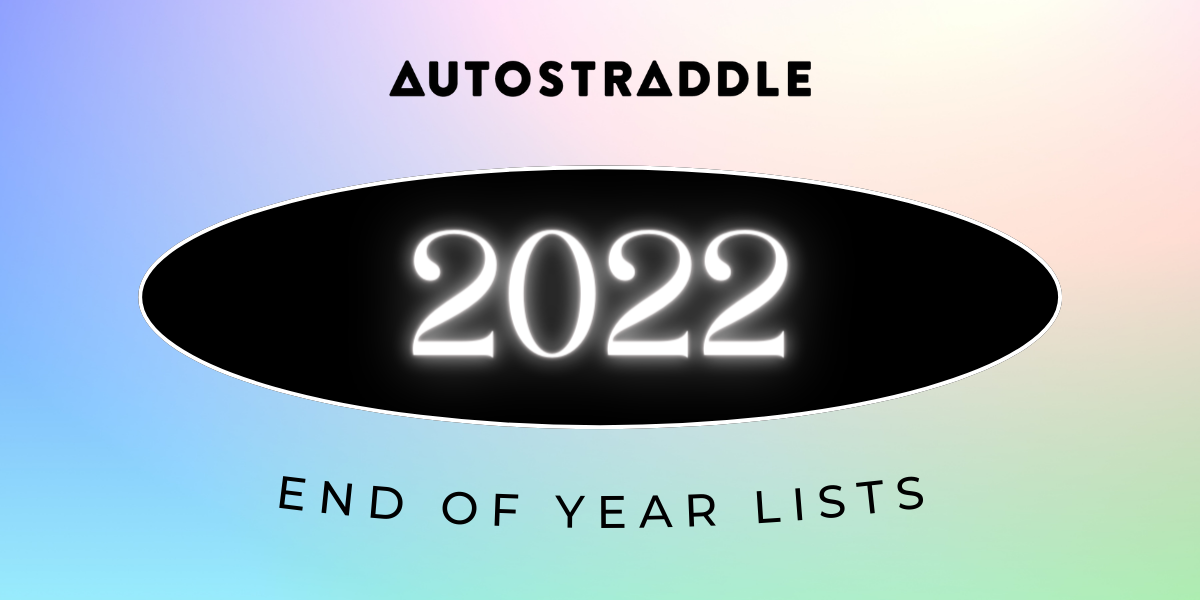
Every year it gets harder and harder to make this list and, honestly, that is a problem I am so grateful to have. There were a huge amount of amazing queer books published this year. I am thrilled to see queer lit blossoming within my lifetime. I can’t believe that as a young adult I was actually able to read most of and keep track of all the sapphic books coming out. That would be impossible now! And, truly, that’s a good thing because in 2022 there is something for every queer reader.
Almost every category in this 2022 best of list was very competitive. There are a lot of very good books that I had to leave off! Instead of limiting each category to five books, this year I’ve included six for most of them because it was too painful to narrow it down any further. Okay, now what you’ve all been waiting for: the best queer books of 2022, all 92 of them!
Comics / Graphic Novels or Memoirs
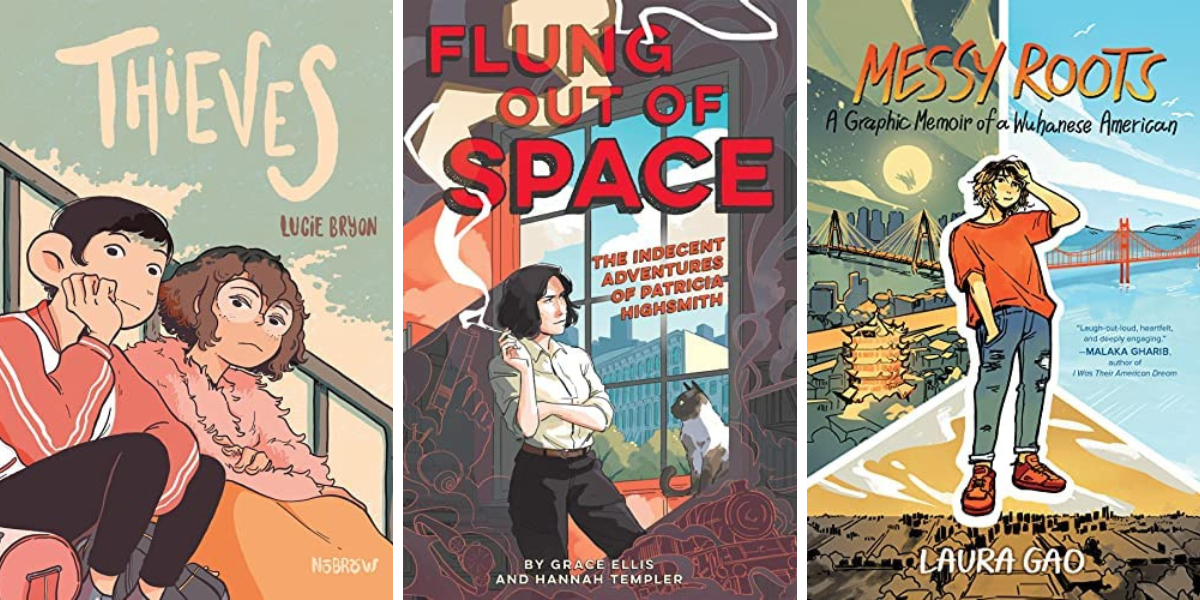
Thieves by Lucie Bryon
Lucie Bryon’s gorgeous, expressively drawn romance between two French teenagers is impossibly sweet, fun, and cheerful. Ella and Madeleine both have a tendency to kleptomania and the consequential plot — crashing parties in order to return things they’ve stolen from people’s houses — is pure delight. Character development and emotion are expertly conveyed in Bryon’s energetic lines and strategic use of a single fitting color per scene. As Ella and Madeleine fall for each other, you’ll fall for them.
Flung Out of Space: Inspired by the Indecent Adventures of Patricia Highsmith by Grace Ellis and Hannah Templer
As Heather Hogan writes in her review for Autostraddle, Flung Out of Space is “an exceptional graphic novel, and a grown-up one too.” Grappling honestly with the complicated legacy of Patricia Highsmith, her acclaimed novel The Price of Salt, and its film adaptation Carol, the book features precise, atmospheric, and noir-esque art; an excellent clipping pace; and snappy, smart dialogue. The subject matter and the visual style are a perfect match here.
Messy Roots by Laura Gao
Subtitled “A Graphic Memoir of a Wuhanese American,” this delightfully funny book has been noted for its relevance to Covid-19, but it’s so much more than that. Gao’s art is emotive and fun, her spare use of color popping to great effect at the text’s big moments. Her style shifts effortlessly throughout. Tackling the evolution of her queer, immigrant, and Asian identities throughout her life, Gao’s narrative is a reminder of how meaningful and energizing coming of age and coming out stories can be.
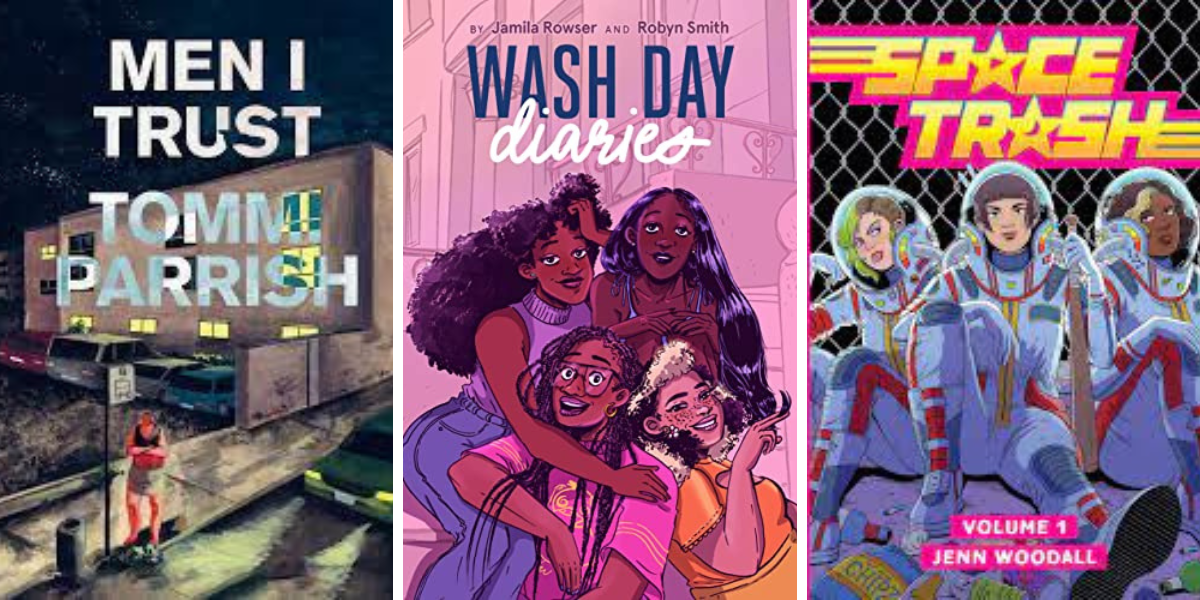
Men I Trust by Tommi Parrish
The stunning, dreamy, surreal pages of full color art alone work wonders to tell the story of complicated queer friendship and millenial loneliness that is Men I Trust. The main characters, Sasha and Eliza, are deeply colored, hand painted women with oddly small heads and huge bodies, just people trying to make their way through the hellscape of late stage capitalism. In her Autostraddle review, Drew Burnett Gregory writes about the book’s unique art: “The distance their style creates reveals itself to be an invitation.” This graphic novel is a searing look at how worthwhile it is to create real intimacy despite its difficulties — the difficulties the novel itself digs into deeply.
Wash Day Diaries by Jamila Rowser and Robyn Smith
An incredibly moving and powerful testament to Black women, their friendships, and their hair, Wash Day Diaries is a wonderful example of how beautiful, vibrant art is made through focusing on small daily details and specific lived experiences. Each chapter’s art style and color palette are expertly adjusted to fit the featured character, with Davene, for example, a character experiencing depression, drawn in blue shades. The dialogue of these Bronx ladies is skillfully rendered; the result is seemingly effortless authenticity. All together, the book is a triumph of joy while also smartly tackling issues like mental health, familial homophobia, and deciding if/when to settle down with someone you’re dating.
Space Trash, Vol 1 by Jenn Woodall
With a lively, intricate art style that is simultaneously futuristic and vintage 80s punk, Space Trash, Vol 1 makes the science fiction dystopian world — technically, moon — these three sapphic teens inhabit seem oh so real. Woodall’s clever, biting words are an equal match to the art’s vivaciousness. The fully realized characters are as endlessly charming as their story is compelling. This comic succeeds in the same way that the best Buffy the Vampire Slayer episodes do: effortlessly combining mundane high school experience with the speculative, with an extraordinary cumulative punch.
Fantasy
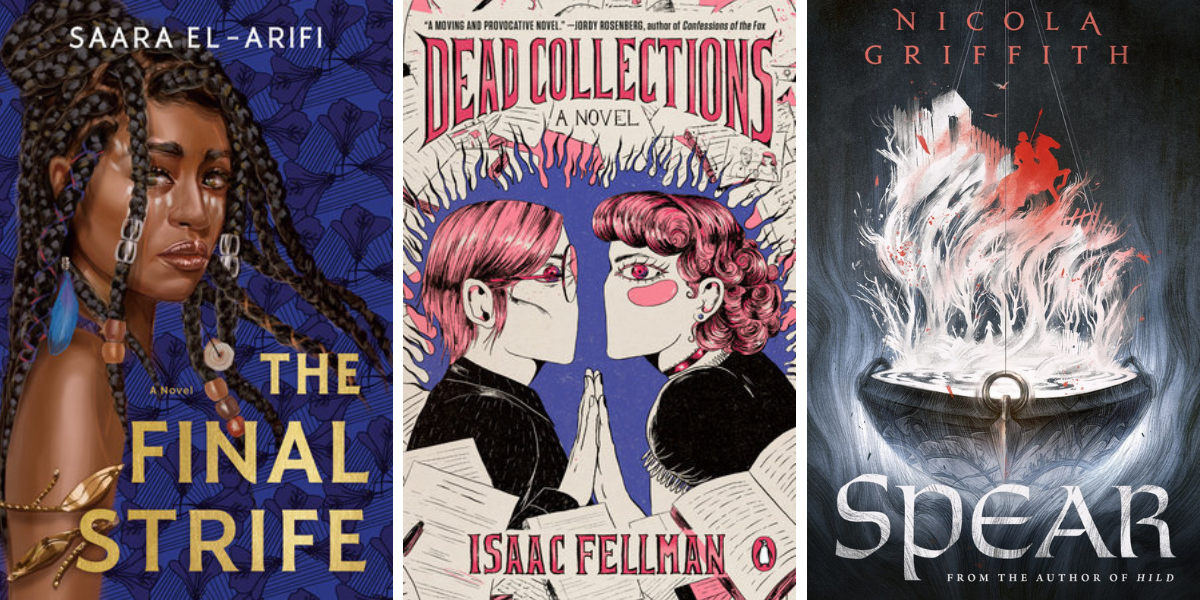
The Final Strife by Saara El-Arifi
With deep roots in Ghanian and Arabian mythology, this dense, engaging fantasy is pure magic. The Final Strife is epic fantasy at its best: layered, complex world-building; gripping plotting that will have you staying up past your bedtime; expert pacing; and let’s not forget unique sapphic characters going on a journey from enemies to lovers! Sylah, Anoor, and Hassa are engaging, achingly real characters whose alliance to take down a cruel empire is a joy to experience. El-Arifi’s exploration of themes including addiction, rebellion, love, class, and hierarchy is thoughtful and moving.
Dead Collections by Isaac Fellman
This delightfully weird paranormal / urban fantasy is a truly new and creative take on vampirism, and not just because the vampire in question is trans. Dead Collections is part eccentric romance, part subtle mystery, and part melancholic character study of Sol, a neurotic undead archivist. Fellman’s portrayal of vampirism as a chronic illness is thought-provoking and unique, as is his writing on grief, fandom, gender, and music, as they come up in relation to Sol’s story. This novel is a big winner for both avid readers of character-driven fiction and fans of vampire stories of all stripes.
Spear by Nicola Griffith
Griffith’s queer feminist retelling of Percival the Knight has a timeless, old-fashioned ambience to its storytelling while at the same time feeling very grounded in details of 6th century Welsh life. Peretur is a special fantasy protagonist, not only as a gender nonconforming lesbian, but as a superhero / half god whose powers come from being incredibly in tune with nature and the environment. Spear shows us that there are still new King Arthur stories to be told. Read Heather’s full review on Autostraddle, where shw declares that Griffith “flips the whole legend on its head, while keeping a keen eye on all the mythology that came before it.”
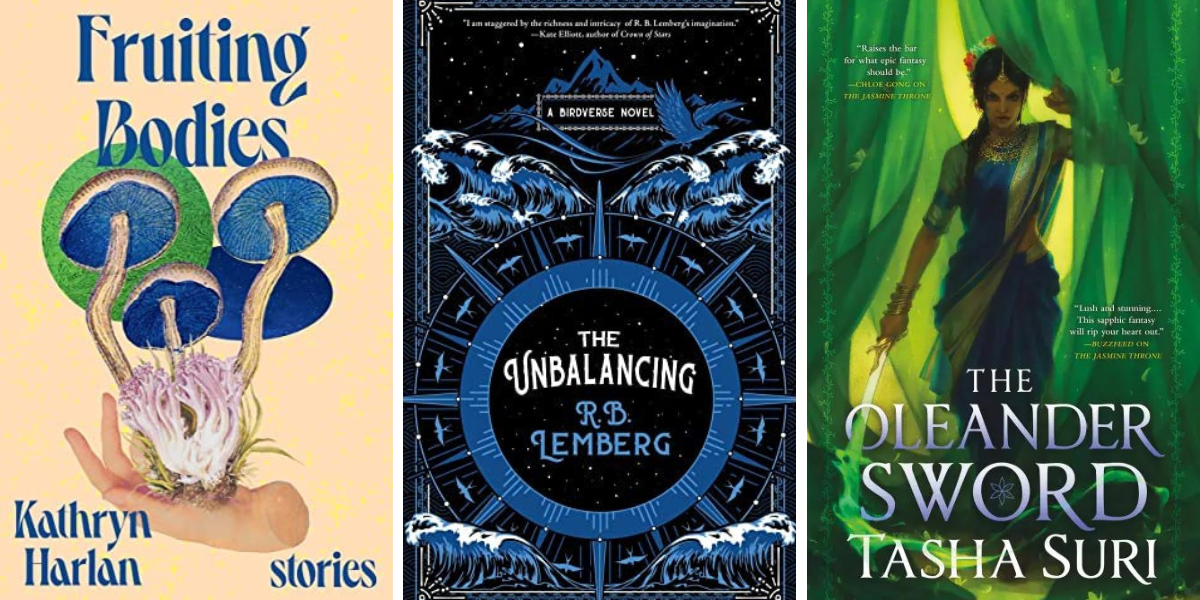
Fruiting Bodies by Kathryn Harlan
These shimmering queer short stories evoke the elements we associate with the original versions of old fairy tales: a creeping sense of dread; tempting danger; bold magical realism; timelessness; surprising yet inevitable outcomes. In lush prose, Harlan captivates the reader with narratives of queer women on the edge of something new, like when a lesbian couple feasts on mushrooms growing from one of their bodies, only to be interrupted by a man. In another story, two young cousins await the arrival of a new addition to their family, convinced he has deadly supernatural powers. The collection’s overall effect is as invigorating as it is disturbing.
The Unbalancing by R.B. Lemberg
Lemberg’s first full novel in their acclaimed Birdverse series is outstanding. With deep roots in queer- and transness, neurodivesity, and mythical cosmology, this loose retelling of the Atlantis legend is intimate and authentic. Two characters, a poet and a starkeeper, fall in love over the course of the narrative as they work hard to save their doomed island home. The book’s lyrical prose, complex characterization, compelling action, and emotional resonance come together to create a flawless fantasy story. For nonbinary representation in adult fantasy, The Unbalancing should be your first stop.
The Oleander Sword by Tasha Suri
The sequel to the much beloved The Jasmine Throne, The Oleander Sword holds its own as an equally stunning tale of sapphic action and revolution. When the story begins, Malini has been declared the rightful empress, but that doesn’t mean deposing her brother will be any less difficult or bloody; Priya is determined to rid her people of a slow-spreading sickness but she doesn’t yet understand the magic inside herself that will help her accomplish the task. Inspired by India’s history and culture, Suri’s feminist world-building continues to be ambitious and expansive. Her lovable yet ruthless priestess and princess protagonists are unforgettable characters. This is the kind of phenomenal queer South Asian epic fantasy we deserve!
Horror
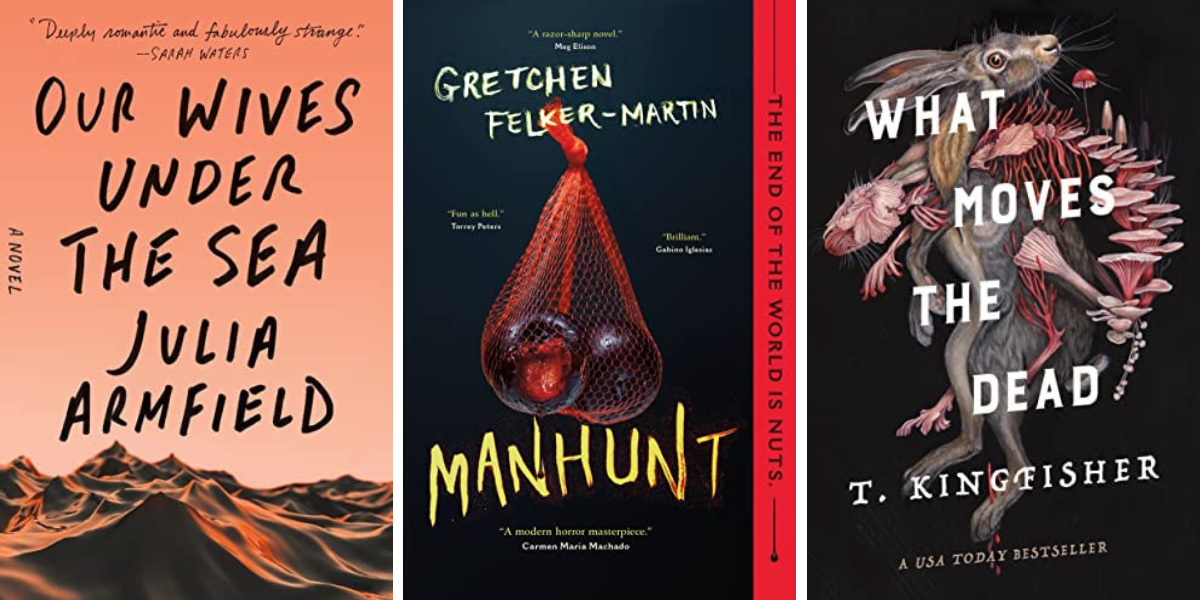
Our Wives Under the Sea by Julia Armfield
In her review for Autostraddle, when Kayla Kumari Upadhyaya writes that this ocean horror novel’s language “is like a fork’s tines moving through perfectly cooked fish: grotesque and lovely all at once,” she might have been describing the book’s overall effect. While languishing in Armfield’s stunning writing and sharp-eyed observations, the reader experiences an expertly crafted creeping sense of unease. What exactly happened to the wife under the sea while on a mysteriously long submarine expedition and will her marriage survive the aftereffects? It’s to the novel’s credit that the end feels both completely shocking and an inevitability.
Manhunt by Gretchen Felker-Martin
In Felker-Martin’s bold splatterpunk post-apocalyptic horror novel, TERFs are the villains and a new virus has turned any human with a certain level of testosterone into a raging homicidal rapist zombie. But as Drew writes in her intro to the Autostraddle interview with the author, “the novel is so much more than a provocation.” Felker-Martin explores trans women’s relationships to each other and themselves, the confusion of safety and comfort, dystopian sex, and more. Manhunt is as brutal, disgusting, and thought-provoking as it’s meant to be. Check out Felker-Martin’s article for Autostraddle about writing from a TERF character POV in this novel.
What Moves the Dead by T. Kingfisher
This queer retelling of Edgar Allen Poe’s “The House of Usher” is just the entry we needed in the flourishing subgenres of both gothic horror and fungi horror (yes, you heard me correctly). As deliciously creepy as it is inventive with world-building, What Moves the Dead is about a nonbinary soldier — pronouns specific to that stature in society — who encounters increasing terrors while visiting an ill friend at a secluded manor. The terrifying imagery is matched, somehow, by equally satisfying humor. With a rollicking pace and an engrossing mystery, this novella succeeds on every level.
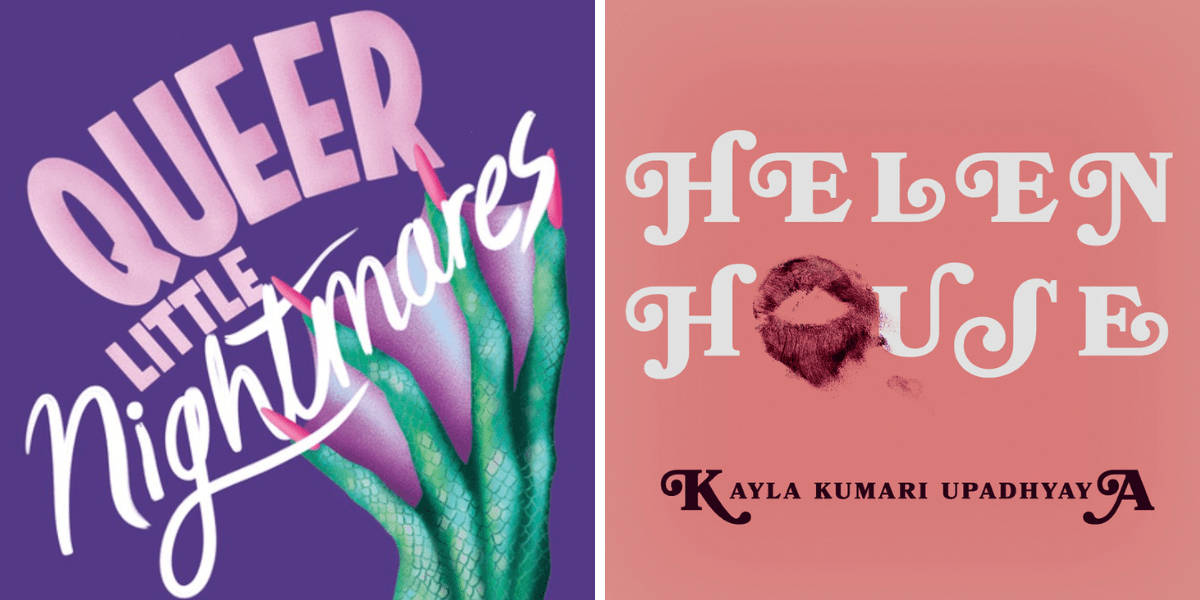
Queer Little Nightmares edited by David Ly and Daniel Zomparelli
Monsters within and without — but not necessarily something to be afraid of — are the theme of this diverse, entertaining anthology of fiction and poetry that explores the links between horror and queerness. Standouts include Hiromi Goto’s wonderfully dark and bloody story about a perimenopausal woman devouring her own sentient creature-shaped menstrual blood clots; Amber Dawn’s delightful story with vintage horror movie camp vibes about young rural lesbian werewolves; and Levi Cain’s hilarious yet disturbing story about a narrator’s 30-foot tall murderous monster girlfriend who eats cops and rude neighbours.
Helen House by Kayla Kumari Upadhyaya
This lesbian ghost story centered on the terrifying ritual of going home to meet your girlfriend’s parents for the first time beautifully dances around the question of whether the haunting is “real” or not. In Stef Rubino’s review for Autostraddle, they write that “Upadhyaya builds profound atmospheric tension in a small amount of space and flips certain tropes in stunning directions.” While doing so, the book explores themes of grief, trauma, therapy, and sex with nuance and imagination. Creepy illustrations by Kira Gondeck-Silvia are the icing on top of this horror novelette by Autostraddle’s very own managing editor! Read more about the book in Nico Hall’s interview with KKU herself!
Historical Fiction
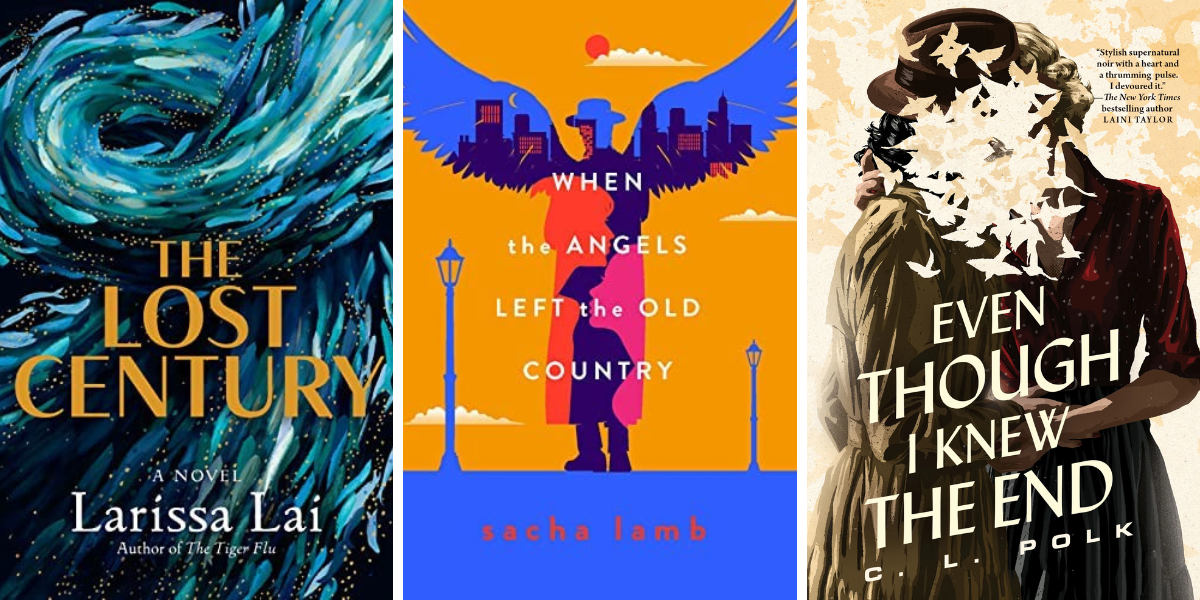
The Lost Century by Larissa Lai
Lai brings her expertise in rich world-building from her speculative fiction to this historical novel set in the mid 20th century in Hong Kong. Beginning in a frame narrative in 1997 when Violet asks for a family history on Hong Kong’s last day as a British colony, the engrossing narrative delves into Hong Kong’s complex and dystopic mix of people, nationalities, races, and motivations. While a clear indictment of colonialism and empire, the novel also resists telling reductive moral lessons. Lai chooses to focus on the resistance and resilience of women and on the riveting family drama that propels the action.
When the Angels Left the Old Country by Sacha Lamb
This breathtaking historical fantasy could have found a home in this list’s fantasy category, but it is so rooted in early 20th century Jewish emigrant experiences that its historical aspect is equally important. While a (genderless) angel and a (disabled) demon are the focal points of the novel, the leave taking of their shetl is fueled by an entirely human missing young emigrant. The characters they meet along their journey to the US are gorgeously drawn, bringing historical queerness to the forefront. The story feels timeless like a piece of Jewish folklore and as well-plotted and intricately researched as a novel by a writer with three times more experience than this debut author.
Even Though I Knew The End by C.L. Polk
Equal parts magical fantasy, noir mystery, and sapphic period piece, this novel brings to life 1940s Chicago in its delightfully seedy glory while not ignoring the setting’s oppressiveness for its queer inhabitants. Helen, the magical exiled PI fighting for her literal soul as well as the chance to spend the rest of her life with her partner, is a terrifically crafted character driven by love. Polk particularly excels at creating an intensely foreboding and dark mood, an atmosphere thick with tension, grit, and blood. It’s the kind of book you’ll thank for breaking your heart.
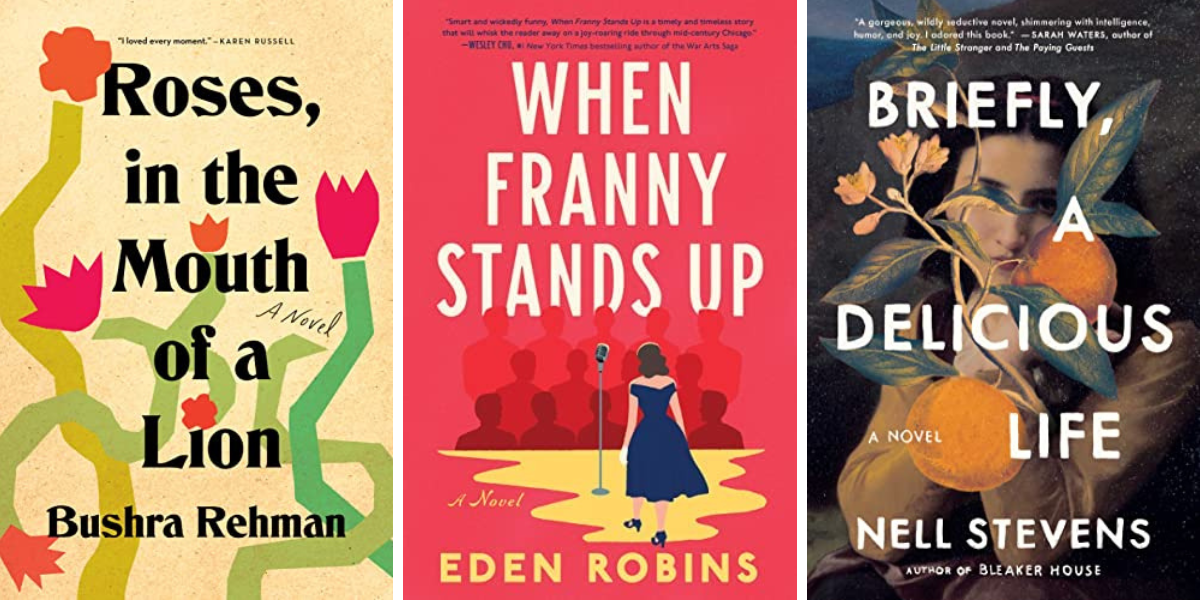
Roses, in the Mouth of a Lion by Bushra Rehman
Eschewing a straightforward linear structure, this beautifully written coming of age story presents vignettes throughout the protagonist Razia’s life. Focusing on women and girls’ friendship and queer love in Queens’ Pakistani American community in the 1980s, the novel is quietly ferocious. It insists on Razia’s Muslim faith as much as her queerness and revels in the grey, in between places. Characters and the setting are equally richly drawn and Rehman’s prose is alternately delicate and fierce.
When Franny Stands Up by Eden Robins
A moving tribute to women comedians of the past, this historical novel with a magical realism edge is set in 1950s Chicago. Franny, our big-mouthed wiseass sapphic Jewish main character, is searching for her Showstopper, the new phenomenon of a joke by a female comedian that momentarily takes the laughing audience — women only — to a place of euphoria. Robins’ narrative delicately explores the relationship between trauma and comedy, eliciting plenty of laughs while also providing a thoughtful look at found family, sexual assault, PTSD, and mid-century queer life. Robins’ writing is snappy, her characters — particularly secondary ones — are memorable, and this novel’s conceit is an utterly unique alternative history expertly played out.
Briefly, A Delicious Life by Nell Stevens
This tale about a teenage ghost who falls in love with Victorian novelist George Sand is charming and lively in a way you might not expect for a novel about a girl who’s been dead for 400 years. Set in a meticulously drawn 19th century provincial Italian town, Briefly, A Delicious Life explores ghost Blanca’s unrequited longing for a woman whose unconventionality pushes her in the same dangerous direction that led Blanca to her own death. The book provides moving investigations of the troubling nature of desire, the complexities of making art, and the double edged sword of living your life in opposition to repressive norms.
Literary / Contemporary Fiction
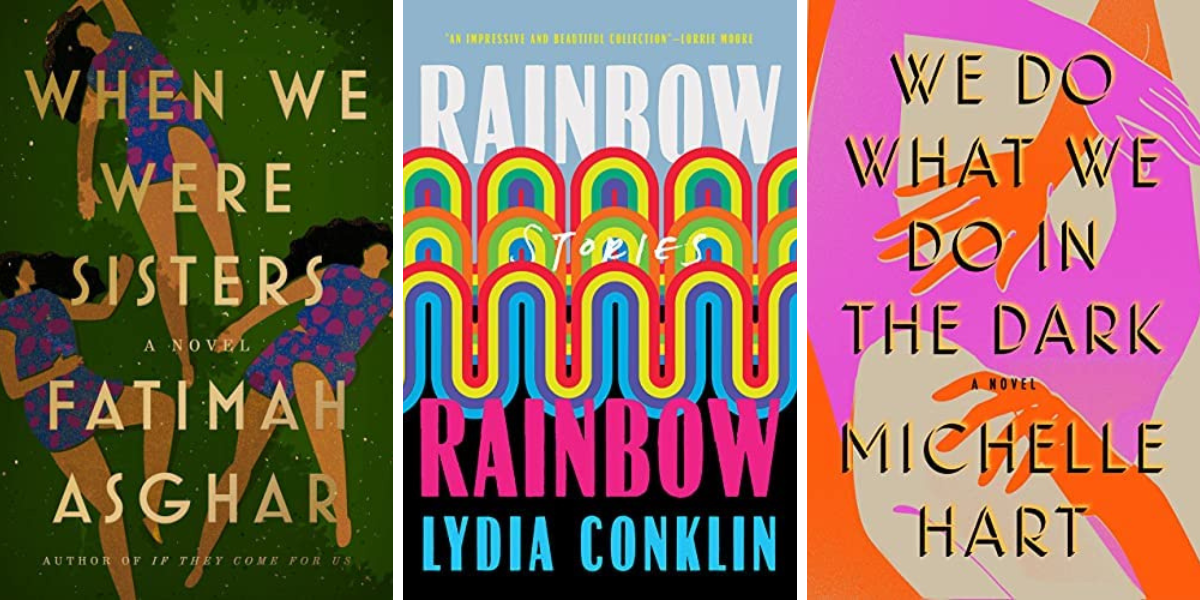
When We Were Sisters by Fatimah Asghar
This debut novel that shea calls “a salve” for grief in their review for Autostraddle, is “graceful in language, meticulous in form, and rich in narrative.” The book follows three orphaned Muslim American siblings as they grapple with their relationships to themselves, each other, and the world. Asghar’s lyrical prose and formal experiments elevate this beyond even an above average queer coming of age story. These are characters and a story that will both haunt and soothe you long after you turn the last page.
Rainbow Rainbow by Lydia Conklin
Conklin’s first collection of short fiction shows an astounding amount of diversity and range in its queer characters and narrative voices. As Yashwina writes in her review for Autostraddle, there is no shortage of things to praise in Rainbow Rainbow: “its melancholic realism, its desperate and heartfelt protagonists, its narrative willingness to follow through with consequences rather than to flinch from the implications of a story’s action.” From a woman her loves her girlfriend but not so much her girlfriend’s dog to a trans guy trying to confess his love to a fellow queer book club member, these are stories with both unique characters and premises that fulfill their potential in unexpected ways.
We Do What We Do in the Dark by Michelle Hart
It’s difficult to do something new and smart with a common queer trope like an age gap lesbian romance, but Hart’s debut novel does just that. Drew writes in her Autostraddle review that “Hart’s novel is such a triumph because it goes beyond this one defining relationship.” The narrative also focuses on the protagonist Mallory before the life-changing affair — other relationships with her best friend and her best friend’s mom as well as the suffocating suburban culture Mallory carries with her. The result is a grounded, contextualized, moving character study about coming out of hiding, looking for belonging, and letting yourself want.
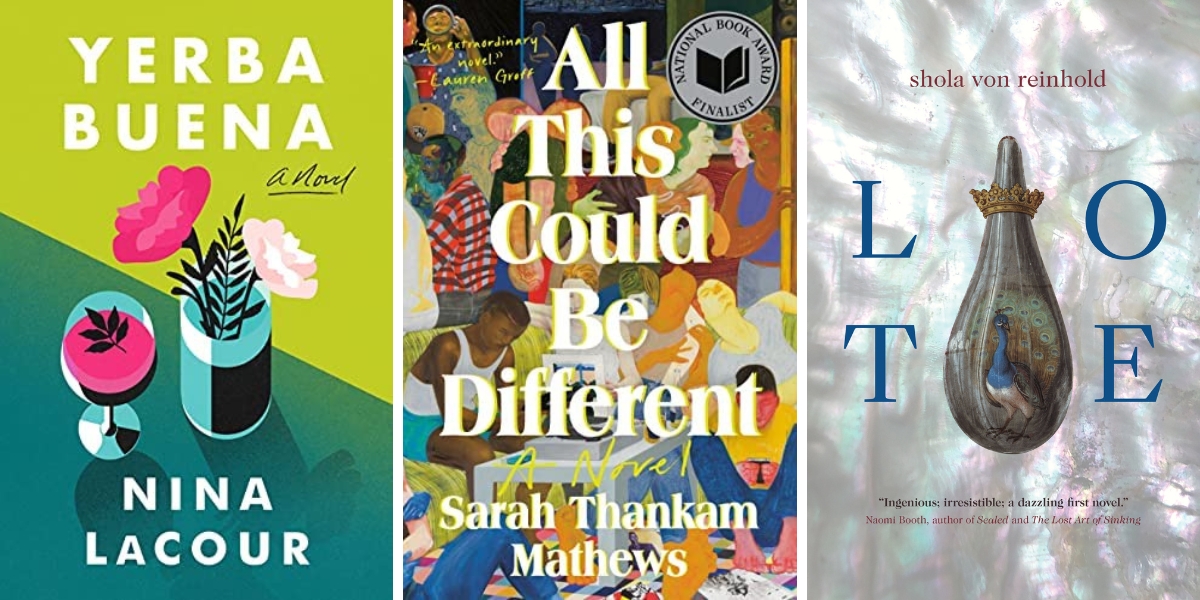
Yerba Buena by Nina LaCour
Acclaimed YA author Nina LaCour’s adult debut is a triumph, a culmination of her experience delicately manipulating generic expectations and talent for crafting nuanced, intricate characters. Yerba Buena also boasts gorgeous, understated, evocative prose; a rich sense of place (Los Angeles); and a focus on pleasure, beauty, and growth while not forgetting pain, loss, and grief. As Yashwina’s glowing review aptly summarizes, “upon the bedrock of the love story arises a beautiful narrative of two people healing their respective traumas and rebuilding their respective families alongside one another.”
All This Could Be Different by Sarah Thankam Mathews
KKU’s review of All This Could Be Different declares it to be a “masterclass in character development,” with “the characters’ hopes, dreams, and desires … so fully rendered on the page that it’s difficult not to absorb them.” The characters, setting, and story are viscerally real and brilliantly crafted, with frequently stunning sentences. Refreshingly, the novel focuses as much on friendship, work, community, and the practical details of building an adult life as it does on Sneha’s first major romantic relationship. This slice of queer, brown, immigrant, millennial life is sharply insightful and exquisitely beautiful.
LOTE by Shola von Reinhold
Spirited and experimental, LOTE is part alternative history about modernist Black artists and part meditation on contemporary hero worshipping and literary obsession. In one of her Reading Rainbow columns, Yashwina praises this book as “playful-yet-rigorous” and “such a smart novel about the lost and found heroes of our artistic heritage, and it’s also (cannot stress this enough) fun as hell.” Dedicated to the gloriousness of Black British nonbinary excess and aesthetic expression, LOTE is a book in a class of its own. As the protagonist Mathilda falls deeper into her rapture for forgotten Black modernist poet Hermia Druitt, readers fall into a similar hypnotic space created by Von Reinhold’s immersive and dazzling literary magic.
Memoir / Biography
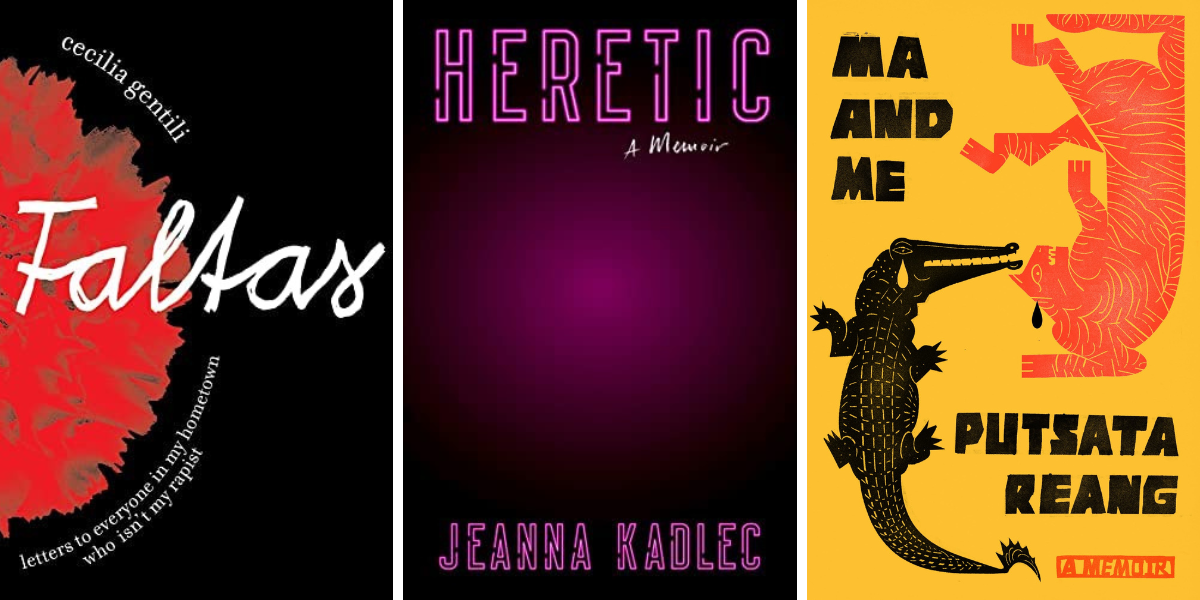
Faltas: Letters to Everyone in My Hometown Except My Rapist by Cecilia Gentili
An “exciting and, at times, breathtaking addition to the canon of works about ‘messy trans lives,'” Stef declares Faltas by legendary trans activist Cecilia Gentili to be one of the best memoirs they’ve ever read. With its brilliant use of the epistolary form and Gentili’s charisma oozing off the page, Faltas is somehow consistently funny and endlessly gracious even as it unravels how she was targeted by an abuser as a queer, trans kid and holds people accountable. Gentili writes with breathtaking directness, remarkable vulnerability, and a charming sense of humor. She reveals not only how she was failed by the adults in her life as a kid, but also how she found joy, friendship, love, gratitude, and freedom nevertheless.
Heretic by Jeanna Kadlec
A memoir in essays for the “witches who grew from good Christian women,” Heretic won Heather’s heart as a “deep, sprawling, incisive indictment of the Christian cancer that eats away at our souls.” Kadlec recounts not only her own story of being a devout Evangelical and coming out as a lesbian but weaves in cultural commentary, political analysis, and history, astutely contextualizing her personal narrative. Kadlec instills a exhilarating sense of hope with her discussions of building new community and her insistence on love and fellowship beyond the confines of the church.
For more on Heretic, read Stef’s interview with the author, where Stef writes that the book is “striking on formal and structural levels,” and that “it prompted [them] to re-examine parts of [their] own life.”
Ma and Me by Putsata Reang
In Himani’s enthusiastic review for Autostraddle, she writes how this memoir “resonates powerfully because of how definitively [Reang] fills in that silence [of the loss of family history] for her own family.” Using her expertise as a journalist, Reang recreates her family’s story before and after escaping Cambodia as the civil war came to a head in the 1970s. Reang’s family — especially her mother, on whom the book focuses — were left reckoning with a legacy of trauma, war, grief, genocide, and poverty. Reang’s prose is sparse but powerful as she writes with compassion and nuance about her complicated relationship with her mother and how she struggled with the impossible task of being the perfect Cambodian daughter.
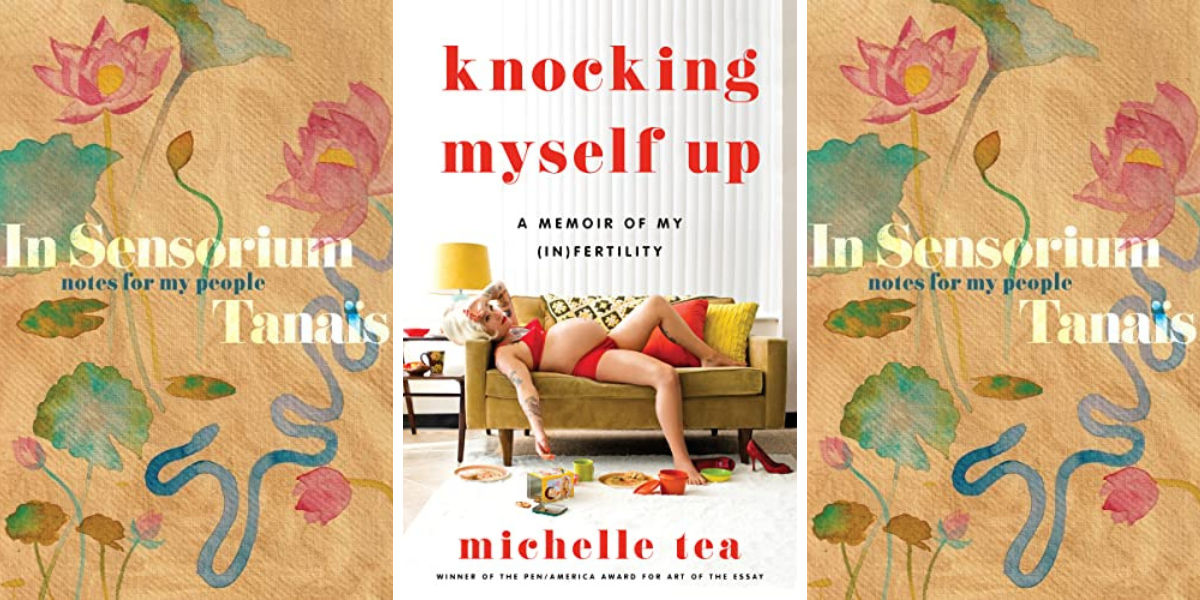
In Sensorium by Tanaïs
A gorgeously poetic book that revels in the most primal sense, smell, In Sensorium is a truly unique memoir that evokes Tanaïs’s experiences as a queer Muslim South Asian femme perfumer and tells South Asian history from a Bangladeshi American perspective. Formally innovative — the narratives are structured like a perfume, moving from base to heart to head notes — Tanaïs’s book is an eclectic collection of thoughts, prayers, histories, and perfume studies. In her Autostraddle review Em Win calls In Sensorium “robust, assured and sacrosanct” and a book composed of “pieces of life strung together through senses and stimuli.”
Knocking Myself Up by Michelle Tea
In Tea’s trademark candid, reassuring, and very funny voice, she shares her years long project of getting pregnant and having a kid. From inseminating at home with her drag queen friend’s sperm to doing IVF to implant her partner’s fertilized egg in her uterus and deciding when to have a c-section based on what her kid’s astrological sign will be, the memoir is unabashedly queer and compellingly honest. Stef’s review for Autostraddle tells us — to Tea’s credit — this is a pregnancy memoir for everyone, not just people who want to be parents. Also read Vanessa’s interview with Michelle Tea about writing this book in the present tense and more!
Middle Grade
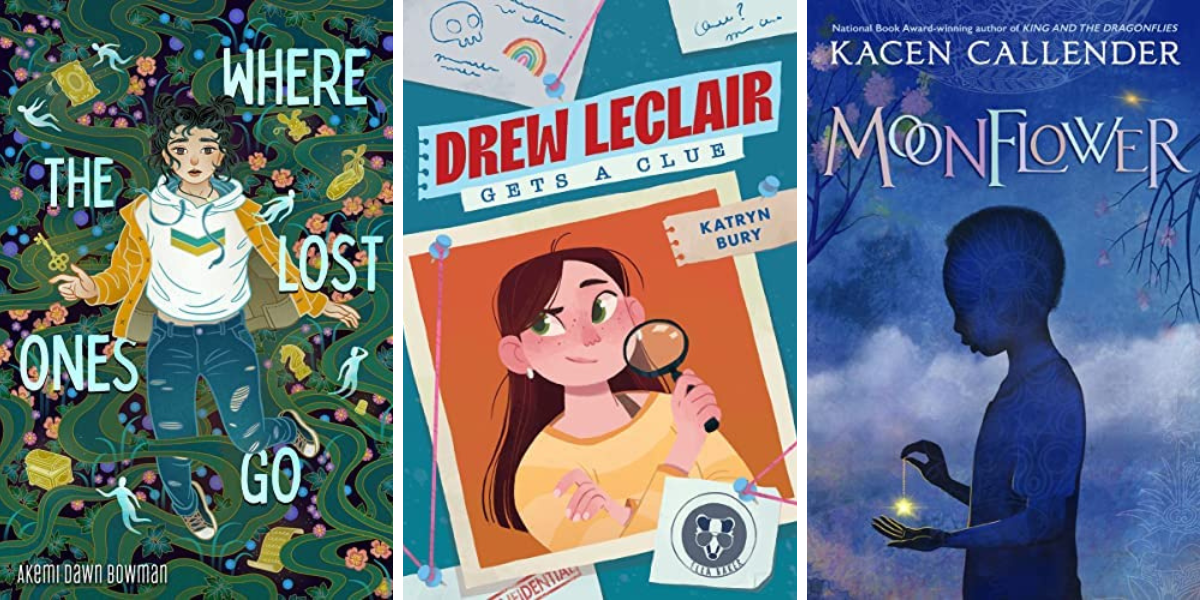
Where the Lost Ones Go by Akemi Dawn Bowman
Bowman’s contemporary fantasy about a 12-year-old biracial Japanese American girl is a stunning investigation of loss, grief, and ghosts. Eliot, the protagonist, has recently lost her grandmother and is desperate for any sign of life beyond the grave, so she can connect with Babung again. Chasing after the prospect of paranormal activity at a haunted house, she teams up with Hazel and develops an adorable crush. The combination of nuanced characters, heartfelt relationships, and careful attention to the full emotional lives of queer tweens make this one a big winner.
Drew Leclair Gets a Clue by Katryn Bury
Reinventing Harriet the Spy for the digital age, this mystery follows 12-year-old Drew as she chases down a cyberbully while trying to hide the fact that her mom has run off with her school’s guidance counselor. Mysteries for tweens and teens are relatively rare, so the fact that this one is so well crafted with a quirky and sweet main character so easy to root for is a real treat. The book’s smart investigation of the complexities of queerness and sexual/romantic orientation and its dedication to not tying everything up in a neat bow (Drew is only 12!) are a gift.
Moonflower by Kacen Callender
In this spiritually moving and beautifully written novel, Callender tackles a young person’s struggles with depression with compassion and care. Moon travels to the spirit realm every night, hoping to never return to the so-called real world. But when the spirit realm is threatened, Moon has to step up to protect it, sparking a healing journey. In addition to their complex representation of a Black nonbinary middle grader and mental illness, Callender crafts a unique fantasy world and creatively uses chapter headings named after healing herbs, flowers, and fruits.
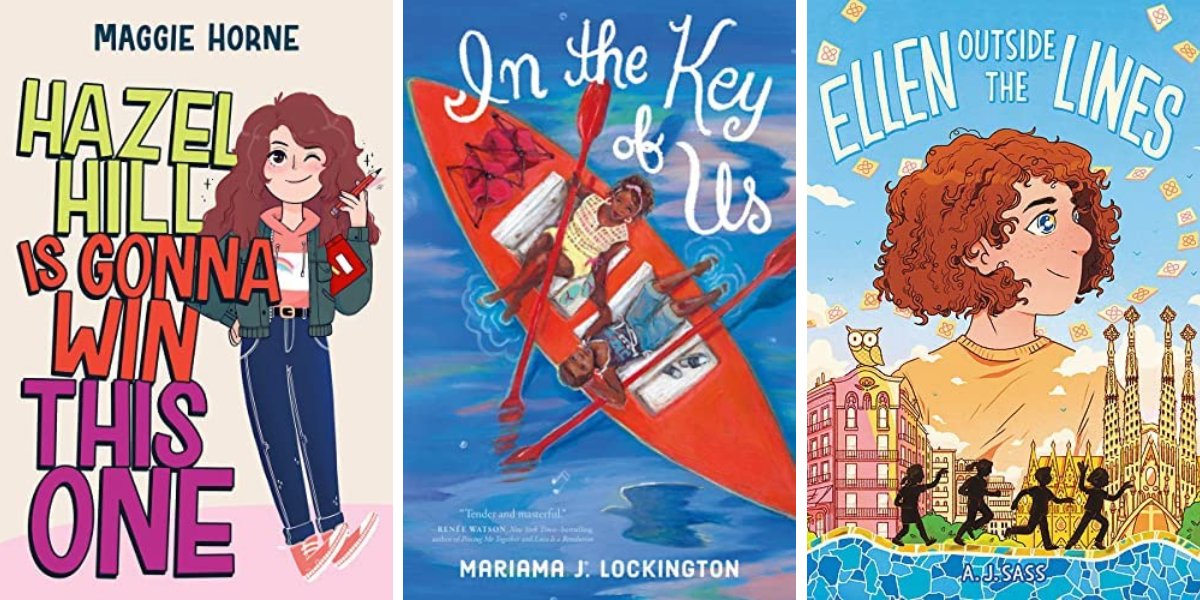
Hazel Hill Is Gonna Win This One by Maggie Horne
Fiercely feminist and queer, this contemporary middle grade novel is about a 12-year-old who hatches a plan to catch a popular boy who is harassing one of her classmates online. The fact that the classmate is Hazel’s nemesis and maybe crush, Ella, adds a wonderful element of conflict. This is both a very funny and empowering read that emphasizes shared sisterhood, solidarity, courage, and generosity. Hazel is a wonderful character in all her tween lesbian glory and her overthinking and anxiety — a great peer for young queer kids to relate to.
In the Key of Us by Mariama J Lockington
A love letter to music camp, Black girls, and first love, this contemporary middle grade is about Zora and Andi, two 13-year-olds who meet at Harmony Music Camp and create an unbreakable bond. Tackling topics such as grief, loss, parental pressure, self-harm, and artistic ambition, em>In the Key of Us is equal parts joy and heartache. Lockington’s prose is evocative, emotional, and immensely readable. The book blends hope and pleasure with its careful treatment of heavy topics effortlessly.
Ellen Outside the Lines by A.J. Sass
Delightfully evoking the voice of a queer neurodivergent 13-year-old, Ellen Outside the Lines follows the emotional journey of Ellen as she navigates changing friendships, a school trip to Europe, and learning to be flexible in her plans. This book is a real page-turner with incredibly engaging characters, lovingly drawn in all their diversity and quirkiness. Ellen’s new nonbinary classmate, Isa, who challenges Ellen’s tendency to think in black and white, is a highlight. An affirming and healing read for queer autistic readers of all ages!
Mystery / Thriller
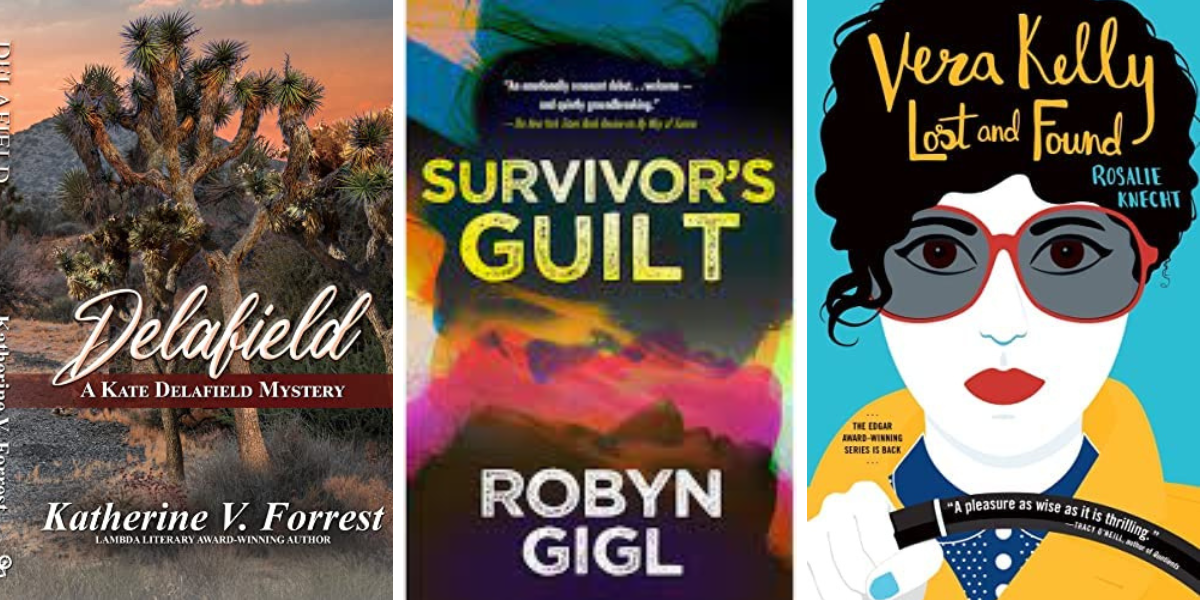
Delafield by Katherine V Forrest
Forrest’s legendary and groundbreaking lesbian detective character Kate Delafield, who first graced the page in the 1980s, returns in this haunting novel. It’s a fitting retrospective for the last book in the series to look back to one of Kate’s earliest cases, a murder outside a lesbian bar. It turns out the woman convicted of the murder has been proven innocent due to now available forensic evidence, and Kate, now retired, blames herself for this mistake and sits waiting for the wrongfully convicted woman to make good on the threat to kill her. Kate is an incredibly complex character, deeply flawed and empathetically drawn. Forrest’s prose and plotting are as precise and bold as ever.
Survivor’s Guilt by Robyn Gigl
This fantastic legal thriller is a time capsule of 2008, both in the details of the court case that deals with technology and in its portrayal of being a newly out trans woman at that time. Erin McCabe, the central character who is a trans attorney with a tendency to take on complicated cases, is a delight. Gigl’s portrayal of Erin dealing with internalized transphobia is particularly thoughtful. The courtroom drama — and drama of occasionally chasing down the bad guys on the street — are riveting, making this a nail-biting narrative equally compelling because of its action and its careful treatment of a case involving trans and cis women being sexually abused. Read until the end for the sapphic happy ending!
Vera Kelly: Lost and Found by Rosalie Knecht
In the third instalment of this captivating historical noir series set in the 1970s, private detective Vera encounters her most personal (and queerest) case yet: the disappearance of her own girlfriend, Max, while visiting Max’s wealthy homophobic family in Los Angeles. In her review for Autostraddle, KKU writes that “even more propulsive than the mystery itself is the romance baked into” the book. Knecht expertly blends elements of both genres while creating an intimate and authentic look at historical queer domesticity. It’s the combination of the quiet character work, fast-paced action, and insight into queer relationships of the past that make this book exceptional.
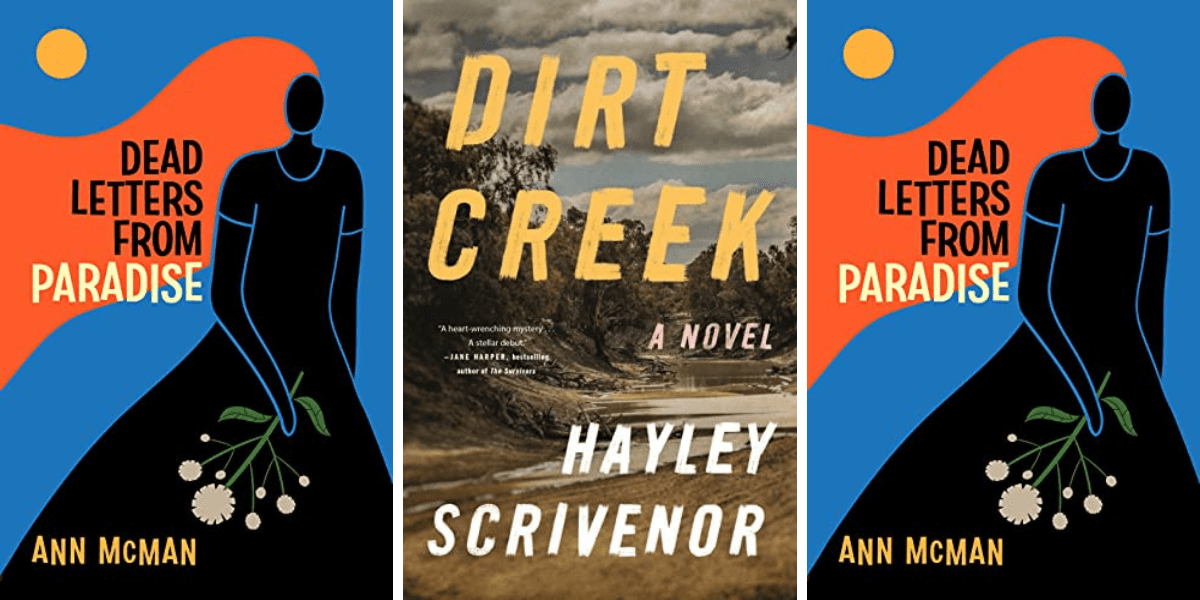
Dead Letters from Paradise by Ann McMan
Set in a small North Carolina town in 1960, Dead Letters from Paradise is award-winning, iconic author McMan at her best. Esther Jane (EJ) is a post office employee and spinster turned plucky amateur detective when she is given a packet of letters addressed to a nonexistent person. Tracking down the origin of the letters, the sender, and the addressee bring EJ down a meandering, unexpected path that leads her on a quest of queer self-discovery. This mystery excels in all areas: tightly plotted; endearing and authentic characters; a rich and original setting.
Dirt Creek by Hayley Scrivenor
Vividly set in a dusty Australian small town whose nickname is the book’s title, Dirt Creek follows a case about the sudden disappearance of a 12-year-old girl. With a seductive slow-burn pace, the novel expertly employs multiple perspectives throughout, including a queer detective sergeant working on the case and a Greek chorus of “we” representing the remaining children in the town. A fascinating character study of a town and its inhabitants as much as a mystery, this is an impressive debut.
Nonfiction
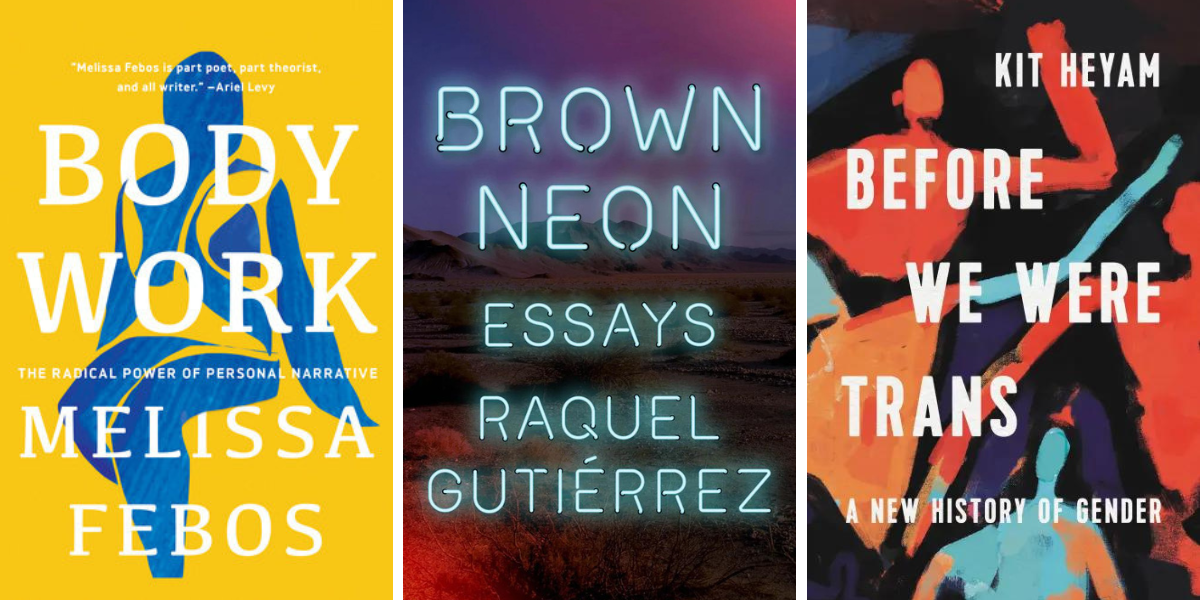
Body Work by Melissa Febos
In this womanifesto about the “radical power of personal narrative,” Febos’ beautifully crafted writing, rigorous feminist intellectual work, and commitment to delving into themes others avoid are on full display. Discussing topics like writing sex scenes, memoir as a feminized form, her own mistakes and growth as a writer, and the connections between trauma and memoir, the book is both a guide on literary craft and a memoir itself. It’s not only a must-read for would-be memoirists, but for memoir readers as well. Read Yashwina’s interview with Melissa Febos, where they talk about medieval women’s autobiographical writing, first drafts, and of course this very book!
Brown Neon by Raquel Gutiérrez
In this “tribute to the power of art and community in the American Southwest,” Gutiérrez writes with “wit, curiosity, and compassion,” Stef tells us in their Autostraddle review. Divided into thematic sections on community building, colonization in the Southwest and Mexico, and queer Latinx art and culture, the book covers a beautiful and impressive range of topics with thoughtful consideration and compelling prose. Highlights include Gutiérrez’s compassionate insistence on not falling into the border war mentality between butch lesbians and trans men in “On Making Butch Family: An Intertextual Dialogue” and the joyful celebration of Gutiérrez’s place in a lineage of queer Latinx artists in “Vessel Among Vessels: Laura Aguilar’s Body in Landscape.”
Before We Were Trans by Kit Heyam
A groundbreaking and illuminating book of trans nonfiction, Before We Were Trans not only presents a new history of gender nonconformity but shows how trans people are implicitly and explicitly written out of mainstream history due to reductive understandings of gender and sexuality. In their review Stef praises the book as a “welcome and significant — and joyful, even — contribution to our cultural conversations on the malleability of gender and on gender nonconformity.” With absorbing in-depth chapters on diverse places and time periods such as 11th century Persia, Edo period Japan, early modern England, and the Kingdom of Ndongo (what is now Nigeria), the book’s scope is truly global. Heyam also, critically, includes reflections on their own place as a white scholar and their attempts to subvert a white gaze.

How Far the Light Reaches by Sabrina Imbler
Imbler’s unique, stunning essay collection combines their experiences as a queer mixed race person working in the overwhelmingly white male field of science and conservation with writing about that very field, the mysterious beings that come from the ocean. Each essay provides a fascinating profile of a sea creature living in an isolated or hostile environment, such as deep sea crabs that have no need for the sun and mother octopuses who die of starvation watching their eggs to keep them safe. Imbler finds radical models for community, care, sexuality, survival, and adaptation, applying them to their own life and relationships. It’s a dazzling, luminescent, brilliant look at life under and above the sea. Read KKU’s review.
The Future is Disabled by Leah Lakshmi Piepzna-Samarasinha
In her Autostraddle review, Katie Reilly writes that this latest work of nonfiction from iconic queer writer and organizer Piepzna-Samarasinha “should be required reading for anyone who works in organizing, education, human resources, or anyone who wants to be an ally to disabled people.”; “[t]he future depends on it,” she declares. Hopeful and affirming, The Future is Disabled shares stories of pain, hardship, and oppression, but it also emphasizes that disabled, queer, and/or BIPOC communities are stepping up to support and care for one another. Piepzna-Samarasinha’s writing is incisive, powerful, wise, and beautiful; this book’s impact will be felt for years to come.
It Came from the Closet edited by Joe Vallese
This diverse anthology of essays that explore the intersections of horror film and queerness is, quite simply, a knockout. Abeni Jones, in her review for Autostraddle notes that “every essay weaves into its analysis a personal reflection on what the film meant to the individual writer, which makes it extremely readable.” The collection ranges from queer readings of classics like The Blob (“Indescribable” by Carrow Narby) and The Birds (“Loving Annie Hayworth” by Laura Maw) to Carmen Maria Machado’s brilliant exploration of bisexuality and queerbaiting and in the more overtly queer Jennifer’s Body. The anthology’s strengths lie in its dedication to the contributors’ unabashed passion for horror and allowing readers to luxuriate in the subsequent queer and trans revelations.
(Read Machado’s entire essay on Autostraddle, where it was an exclusive excerpt!)
Poetry
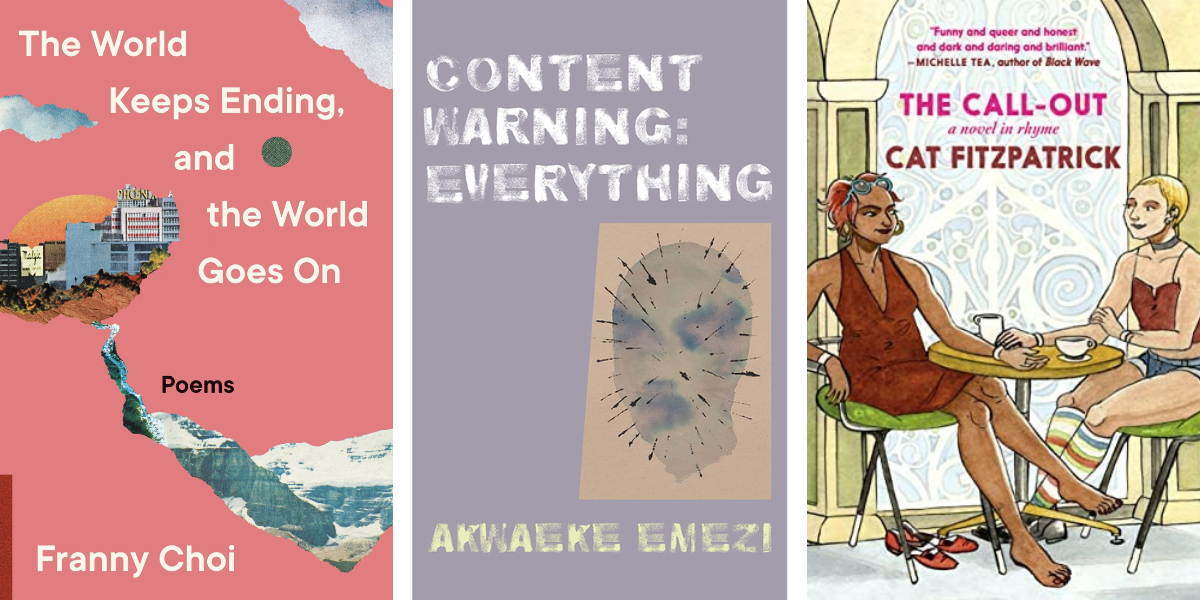
The World Keeps Ending, and the World Goes on by Franny Choi
Full of poems poised for the current moment with its reputation as a dystopia and the end-of-world, The World Keeps Ending, and the World Goes on centers the fact that the apocalypse has already come and gone for many marginalized communities. Choi asks what we can and should expect now, with her trademark musicality and wit. Juxtaposition of traditional poetic structure and colloquial language — “O year, / O shitstorm” — add a playfulness to the poems while they deal with heavy topics and anxiety about the future and present. There’s a wonderful speculative edge to Choi’s writing that adds wonder and hope to these poems, keeping them from wallowing in despair or nihilism.
Content Warning: Everything by Akwaeke Emezi
Queer literary superstar Emezi’s foray into poetry is another powerful display of talent and skill. Focusing on themes of belonging and the self, the poems take inspiration from the divine and the mundane, as Emezi writes “from a spiritfirst perspective.” In their review for Autostraddle, Chinelo Anyadiegwu emphasizes how the collection makes room for multiple, sometimes contradictory selves and tells us that “[t]his is a book to be read and re-read, like all true stories.” They also confirm how deeply and beautifully rooted in Igbo culture the poems and their perspectives are, and how Emezi being an ogbanje permeates the work to stunning effect.
The Call-Out by Cat Fitzpatrick
Gleefully traditional in form yet undeniably of this moment in content, Fitzpatrick’s
tragicomedy of manners written in verse is a true feat. Featuring a cast of queer, mostly trans women living in Brooklyn, The Call-Out is about many of the mainstays of contemporary sapphic culture in NYC: punk houses, queer lit readings, online call-outs, dating app hookups, financial instability, and feminist philosophy. Above all else, this novel-in-verse is so. much. fun. Fitzpatrick’s ease with the sonnet form, of which the book is comprised, is on full display throughout, as she plays with rhyme and word choice to delightful effect.
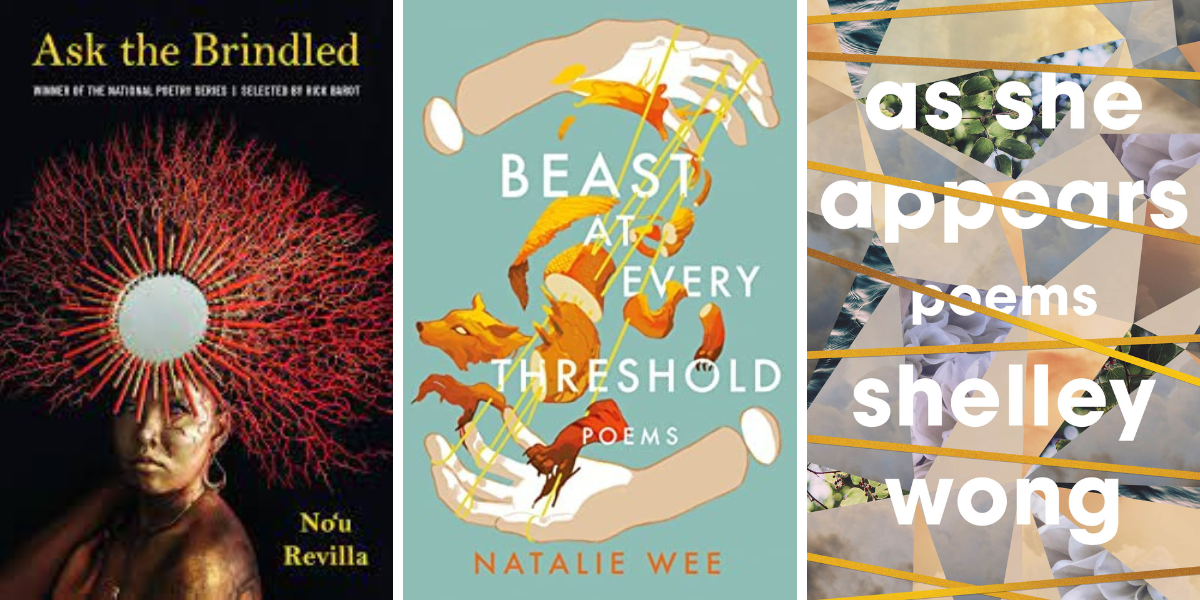
Ask the Brindled by No’u Revilla
Revilla’s debut poetry collection is both lyrically and formally dynamic as she tackles themes such as sovereignty, queer desire, Hawaiian history, decolonization, queer grief, and sacred stories. Wildly successful formal experiments include erasure poetry, visual typography, and a play on the succession of the Hawaiian alphabet; but Revilla also uses more straightforward verse and prose to powerful effect. The book’s approach is intergenerational, both forward and backward looking as the poems reclaim past narratives foisted on queer Indigenous and Hawaiian peoples and dream up a future of abundance.
Beast at Every Threshold by Natalie Wee
This incredible collection of poetry focuses on themes of queer love and desire; pop culture; immigration; racism and being othered; pets and plants; diaspora; myth and folklore; and parenthood and childbirth. Wee’s poems are intertextual in nature, with evocative references from Sappho and Ocean Vuong to Mitski and Phoebe Bridgers. They are delightfully and fiercely innovative in their form, style, and word play: one poem is written as a crossword with clues! Wee’s word choice is often delightfully uncanny, making mundane words strange and wonderful in their unexpected use.
As She Appears by Shelley Wong
A gorgeous celebration of queer Asian identity and the cultures of queer women of color, As She Appears is centred on self-love, self-determination, and pride. Wong’s joyful play with word choice that sometimes switches one part of speech for another — a noun where you might expect an adjective, for example — gives many of the poems a pleasantly puzzling feel. Wong’s unabashed reclamation of feminized or cliché poetic tropes like flowers and fashion are fun and empowering. These poems are stories that you’ll recognize, of dancing wild at Pride parties or satisfying late night hunger at Chinatown restaurants, told askance in a unique poetic voice.
Romance
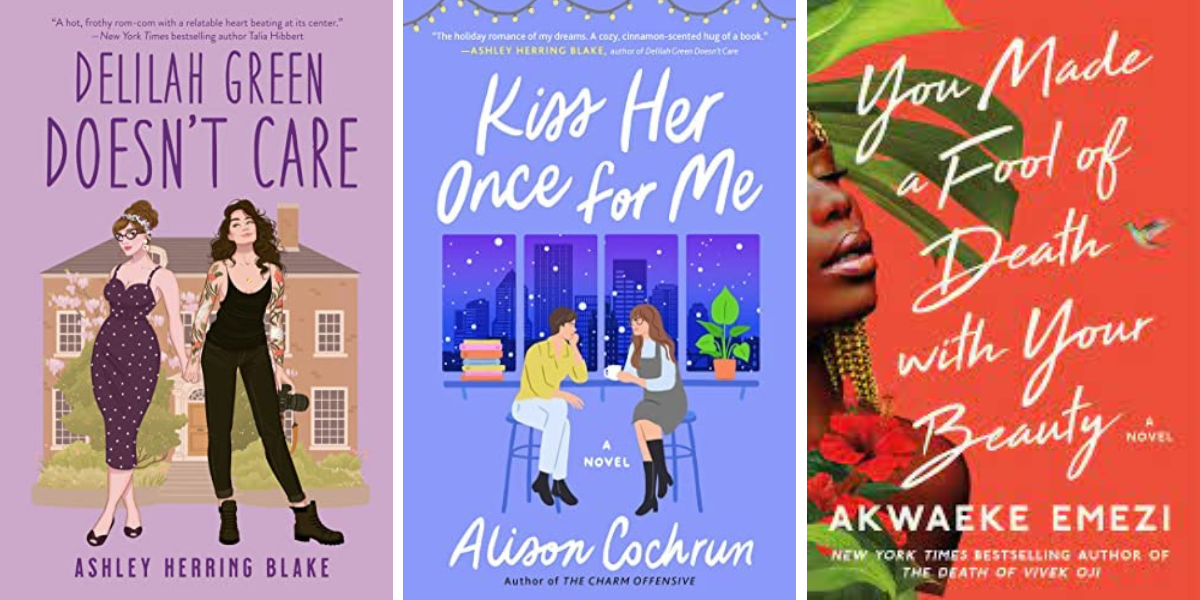
Delilah Green Doesn’t Care by Ashley Herring Blake
Blake arrived on the queer adult romance scene with a bang: specifically, with this much beloved, smart, steamy story about two women who were in close proximity as teens rediscovering as adults that they didn’t really know each other at all. Expertly employing the big-city-girl-returns-to-her-small-hometown trope, the novel follows lesbian photographer Delilah, as she reluctantly goes home to Bright Falls to photograph her stepsister’s wedding and finds a mutual attraction happening with one of the bride’s stuck-up friends, bisexual bookstore owner Claire. Not only does this novel boast a ton of chemistry between the main characters, it also thoughtfully explores complicated family dynamics and invests a lot in nuanced secondary characters.
Kiss Her Once for Me by Alison Cochrun
This bi/lesbian holiday rom com full of authentic details about queer women and Portland truly loves up to its premise, being deliciously romantic and laugh-out-loud funny. The narrative tension around why Ellie and Jack prematurely ended their relationship after one perfect snow day together is expertly drawn out and executed, as is the present Christmas timeline, when Ellie is fake engaged to Jack’s brother Andrew. The novel’s present is unabashedly Christmasy and full of seasonal hijinks, but it’s also a careful and moving look at the results of neglectful and/or manipulative parents on both heroines. The fact that there is a bonus queer romance subplot — Andrew is in fact hung up on his ex Dylan, who is Jack’s nonbinary best friend — is the star on top of this already brightly lit Christmas tree of a novel.
You Made a Fool of Death with Your Beauty by Akwaeke Emezi
Yes, this is the second Akwaeke Emezi book on this list, and no, I will not apologize! In this debut bi-for-bi romance (is there no new genre Emezi can’t succeed in?), Feyi, the main character, begins the story at the cusp of coming back to life five years after the death of her husband. The resulting narrative is a beautifully sensual romance full of pleasure; food, music, art, and nature feature heavily, even as the book remains anchored by grief and loss. Emezi cleverly plays with genre expectations, fills the book with well-rounded queer BIPOC characters, and crafts a moving story that is just as much about Feyi’s personal growth as it is the love story. Chinelo’s review on Autostraddle praises “Emezi’s skillful characterization in combination with the beautiful prose,” which “make this book an immersive experience”; these “characters and worlds that feel real, even as they’re drenched in fantasy and wanting.”
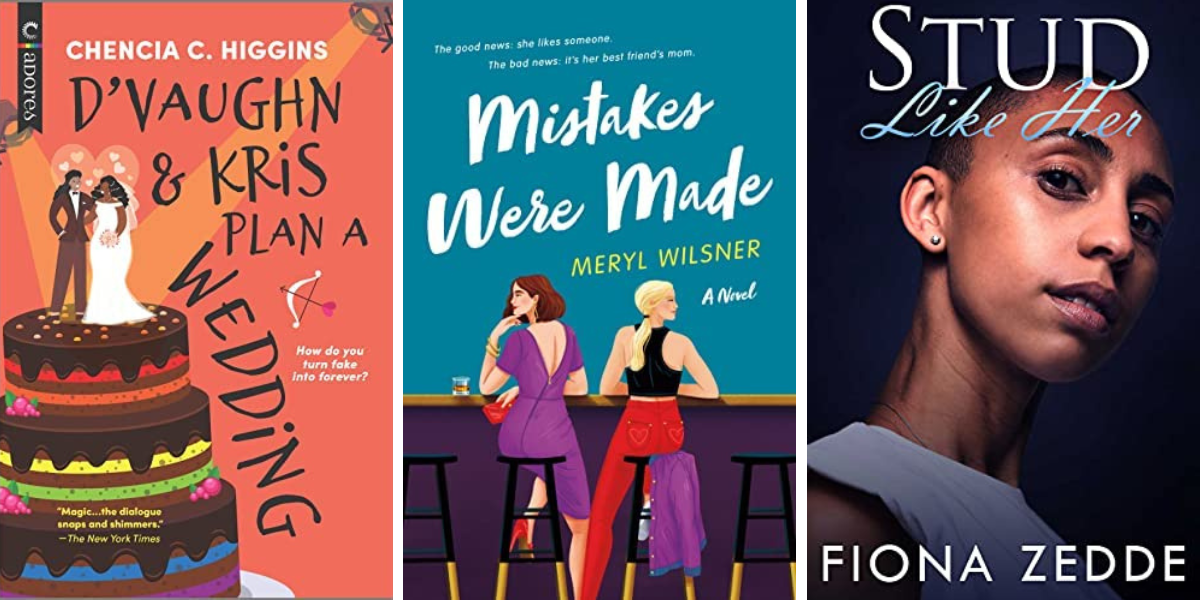
D’Vaughn and Kris Plan a Wedding by Chencia A. Higgins
D’Vaughn and Kris Plan a Wedding is a deliciously fluffy, feel-good romance that has major Niecy Nash and Jessica Betts vibes. Skillfully employing the fake relationship trope, Higgins adds fun reality TV elements by situating her couple on a show where they are pretending to be in love and have to plan their dream wedding in six weeks. The alternating first person perspectives for both characters allows the unique personalities of both heroines to come to life and makes the characterization of the families intimate. For character-driven, low-stakes queer romance, this should be your first stop.
Mistakes Were Made by Meryl Wilsner
Gleefully sexy and unbelievably fun, Mistakes Were Made is the queer MILF romance novel you knew you needed and Meryl Wilsner finally delivered. The love story of 38-year-old Erin and 22-year-old college senior Cassie — who’s friends with Erin’s 18-year-old daughter — is as sweet as it is dirty. Wilsner expertly manages the tension of the big reveal to Erin’s daughter and crafts a compelling “idiots to lovers” narrative about two bisexual women who take way too long to realize they’re meant for each other. Read Christina Tucker’s Autostraddle interview with Meryl Wilsner about writing age gap romances, MILF characters, and subverting tropes.
Stud Like Her by Fiona Zedde
This engrossing stud-for-stud contemporary romance is a complex, delicate exploration of a queer, gender nonconforming character who is struggling with the nature of her desire and its intersections with her gender expression. Chance, the protagonist, has recently left a long term toxic relationship she stayed in for too long because she was afraid of living as her authentic self. Zedde crafts an age-gap romance that is sexy and moving; combined with her expertly drawn flawed, endearing characters — including supporting ones — Stud Like Her is an absolute must-read.
Science Fiction
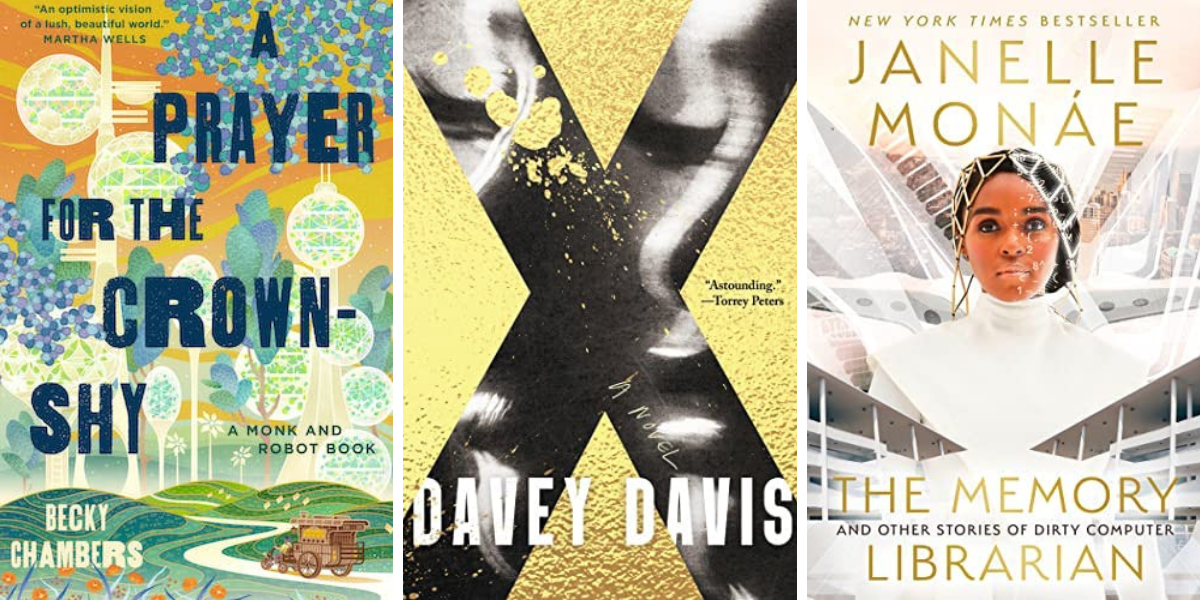
A Prayer for the Crown-Shy by Becky Chambers
The queer book equivalent of a cozy sweater and a warm cup of tea, A Prayer for the Crown-Shy is proof that a utopia can be a fascinating, productive, and truly inclusive setting. This spiritually nourishing, often funny novella is a sequel, continuing to follow two increasingly close companions, a nonbinary monk and a sentient robot. Chambers’ writing is so thoughtful, kind, and curious; the book is full of conversations, open-ended questions, abundance, comfort, and joy. A Prayer for the Crown-Shy is a testament to the power of science fiction to investigate big life questions: how does<\em> one find their purpose in life?
X by Davey Davis
In Drew’s interview with Davey Davis about X, she praises this noir near future dystopian novel as “sticky, thought-provoking, and, simply, entertaining, as we’ve come to expect from Davey.” The novel’s protagonist is Lee, a Brooklyn queer who ends up with a missing person mystery on their hands when a recent sexy hookup named X can’t be found anywhere and they fear she’s among those being forced to “voluntarily” leave the country. Davis’s world-building heightens the anxieties of the present moment in an intensely believable way, with a resulting emotional effect that is chilling. Their clever blend of genre elements and expert pacing are the cherry on top of this immensely readable, smart piece of fiction.
The Memory Librarian by Janelle Monáe, et al
Given Monae’s talent and skill in so many other art forms, it’s not surprising this Afrofuturistic collection of short stories is so excellent. Collaborating with a different author for each piece — Alaya Dawn Johnson, Danny Lore, Eve L. Ewing, Yohanca Delgado, and Sheree Renée Thomas — Monáe digs deeper into her world of Dirty Computer, where the stories are set. Character-driven with creative world-building subtly weaved into the background, the stories focus on how queer Black people experience the facist technocratic New Dawn regime and work towards liberation. Monáe’s writing is as electric as her music, her distinct narrative voice flowing throughout despite the various co-authors.
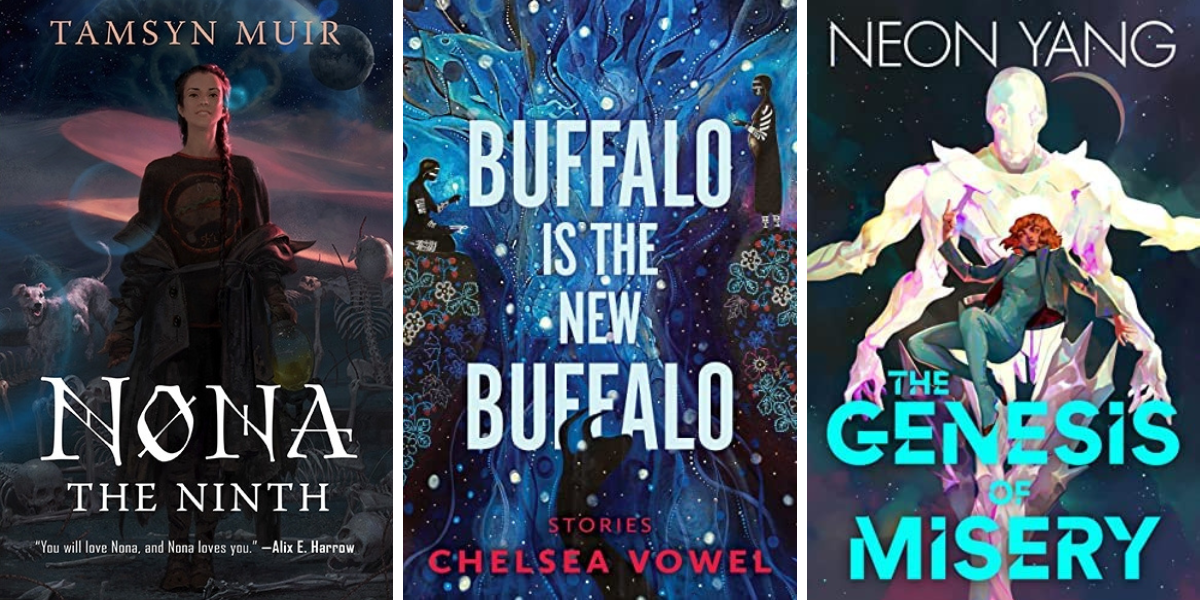
Nona the Ninth by Tamsyn Muir
Full of the “the magic of pulling a coherent self through various times and bodies” as Yashwina writes in her review for Autostraddle, this is the third “kaleidoscope” of a book in the Locked Tomb series set in Muir’s “dazzling space-goth world.” A departure thematically and structurally from the first two books, Nona the Ninth is a more quiet addition to the series that fleshes out the mundane details of the universe. What might at first have seemed like an unnecessary detour becomes a vital widening of scope and a fuller view of Muir’s extraordinary and bizarre world-building. This read is as rewarding as it is challenging — which is very, very.
Buffalo is the New Buffalo by Chelsea Vowel
Vowel’s collection of speculative short fiction is a stunning work of Métis futurism, prompted by this vision: “instead of accepting that the buffalo, and our ancestral ways, will never come back, what if we simply ensure that they do?” The stories create a different future (and, occasionally, a past) that center Indigenous knowledge, imagination, and queer and feminist perspectives. In one story a woman falls for a person who is also a fox; in another, two characters are Two-Spirit rougarou who use their shapeshifting ability to solve a murder and halt Canadian colonial expansion; in another, a queer feminist group collectively parents a child. The stories are made even more exceptional by Vowel’s thought-provoking essay-like afterwards, which situate the stories in cultural context and elucidate her writing and research processes.
The Genesis of Misery by Neon Yang
Yang’s breathtaking space-fantasy is an immersive saga starring a cast of diverse queers embroiled in religious space battles and political chaos. Misery (she/they) — all characters are introduced this way because of computer chip implants, a fun queernormative detail — is a delightfully badass, sarcastic character trying to avoid what they believe is inevitable madness due to their rare stone-working abilities. Yang skillfully plays with the “chosen one” trope while crafting an intensely propulsive read with unexpected plot twists and incisive prose. This is queer space opera at its best.
YA Contemporary / Historical / Romance
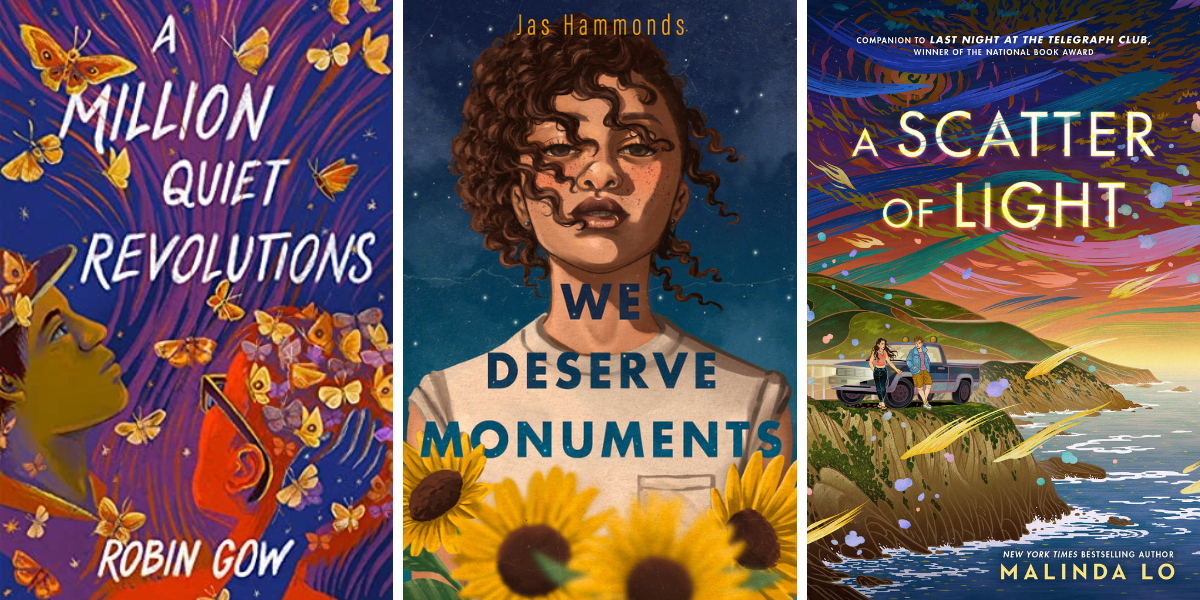
A Million Quiet Revolutions by Robin Gow
Told in gorgeous, non-linear lyrical verse, A Million Quiet Revolutions is the story of an incredible relationship between two trans teenage boys. The novel traces the evolution of Aaron and Oliver as they first fall in love, both come out as trans, grow together, and later deal with being apart. It’s an achingly romantic book that also emphasizes queer and trans history, empowering the two contemporary trans teens by situating them in a long lineage of gender nonconformity. Incredibly emotionally engaging, this YA also boasts meaningful, nuanced Jewish and Puerto Rican representation.
We Deserve Monuments by Jas Hammonds
A contemplative look at family secrets, queer teen romance, Black biracial identity, and small town Black life in the American South, We Deserve Monuments is an very moving contemporary YA novel. The protagonist, 17-year-old Avery, begins the novel moving from DC to Georgia so her family can take care of her terminally ill grandmother. She is soon pulled into a mystery that gets bigger as she unravels it and discovers how deeply the racism in this town is embedded in her family. Hammonds’ writing is poetic and emotionally resonant; her characters achingly real; the pace a delicious slow-burn. Beautiful and heartbreaking feel like insufficient words to describe the effect of this superb book.
A Scatter of Light by Malinda Lo
In shea wesley martin’s review for Autostraddle, they declare that this historical novel is “beautifully composed, often feeling like a peek into your best friend’s hot (queer) girl summer”; it also “reminds us of the light in our truth.” Deeply rooted in the late 2000s and early 2010s (can you believe this is historical?) — particularly the 2013 rulings on same sex marriage — this story is a coming of age / coming out about Aria, a biracial Chinese and white teenager spending the summer with her artist grandmother. Spinning this quintessential set-up, Lo investigates queerness at different stages and ages and the beauty of slow self-discovery. The languid pace, precise setting, and focus on the imperfect messiness of being a young queer person figuring out yourself out are a perfect combination.
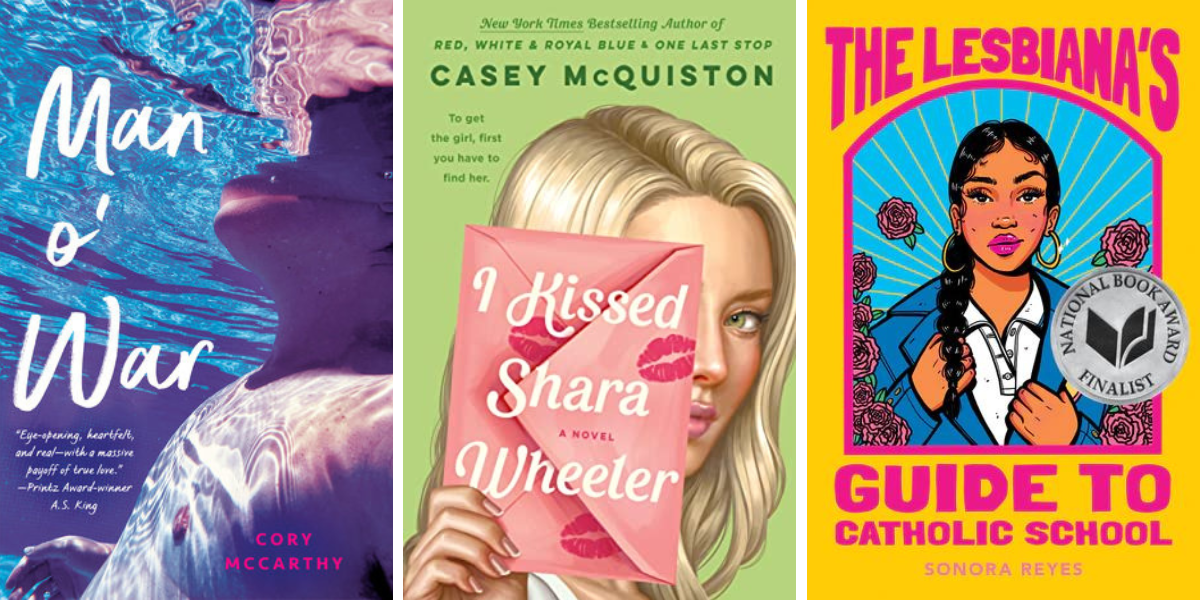
Man O’ War by Cory McCarthy
Equally funny and emotionally vulnerable, this contemporary YA is a coming of age story about a Lebanese-Irish American trans and nonbinary swimmer. McCarthy’s extended metaphor about River — yes, that name is significant — being a natural born swimmer in landlocked Ohio is poignant and effective. The book’s strengths come from its insistence on honoring River’s incomplete journey and the never ending process of becoming yourself. The romance subplot is incredibly adorable and a welcome compliment to River’s difficult path of self exploration and discovery.
I Kissed Shara Wheeler by Casey McQuiston
This swoony YA romance that made Heather’s “little lesbian heart sing provides the essential message that queer “love is indomitable,”; and McQuiston makes Heather really believe it “when [she’s] lost in their worlds.Chloe is a lovable yet challenging protagonist, an overachieving, ambitious teen whose world is turned upside down by an amazing kiss with her nemesis who then immediately afterwards goes missing. Focusing on dynamic relationships not only between the romantic leads, McQuistion writes with their usual wit and careful attention to nuance, which emerges in discussions of homophobia and Christianity in a small Bible Belt town. The fact that McQuiston “stick[s] the landing — Heather’s words — is a fitting culmination of the book’s other admirable attributes.
The Lesbiana’s Guide to Catholic School by Sonora Reyes
Joyful, funny, and romantic, this contemporary YA story follows Yamilet, the new kid at a mostly white, mostly rich catholic school, hoping for a fresh (closeted) start but being sorely tempted by her new school’s only openly queer girl. The heart of this novel is the relationships between two queer siblings, Yami and César: how each of them experience queerness differently, how they both hurt and help each other, and how they struggle and sometimes fail to truly get one another. Balancing a romance plot line with the dynamics of Yami’s Mexican American family and her story of coming into herself, The Lesbiana’s Guide to Catholic School is a perfect brew of its disparate ingredients. This book was recently named a National Book Award finalist, but you know us queers were singing its praises from the beginning!
YA Science Fiction, Fantasy, and Horror

This Wicked Fate by Kalynn Bayron
The final book in a fantasy duology, This Wicked Fate follows its compelling protagonist Briseis as she attempts to use her unique plant-growing powers to save her mother’s life. Bayron’s prose is rich and appropriately floral as she charts Bri’s thrilling journey to locate the missing piece of the Absyrtus Heart, a dangerous force her enemies are seeking as well. As heroic as Bri is, the novel’s commitment to giving her a support system and a solid place in an ancient lineage is wonderful to see. With whimsical world-building in addition to its well crafted characters and plot, there’s no level on which This Wicked Fate isn’t a roaring success.
Dauntless by Elisa A. Bonnin
This delightful Filipino-inspired sapphic epic fantasy is a page-turning novel filled with relentless action and a dash of romance. Seri is a teen girl who works to keep the vicious beasts who attack her People at bay until she meets Tsana, a strange girl whose ability to communicate with the beasts defies everything Seri was ever taught about them being her eternal enemies. With intricate world-building naturally dispersed throughout the story, Dauntless takes place in a universe you’ll be loath to leave. In short, this debut is a gem and a YA fantasy that stands out amongst its many peers.
Lakelore by Anna-Marie McLemore
McLemore’s signature lush prose is on full display in this YA fantasy, as is their dedication to complex queer, trans, and neurodivergent representation. The story centers on two nonbinary Mexican American teens, Bastián and Lore, who have significant connections to a lake and the otherworldly place beneath it. Full of the colorful and lively imagery of alebrijes, the magical world McLemore has created above and below the lake is unique and memorable. The novel’s investigation of Lore and Bastián’s complicated relationship is healing and heartwarming, just like the narrative as a whole.
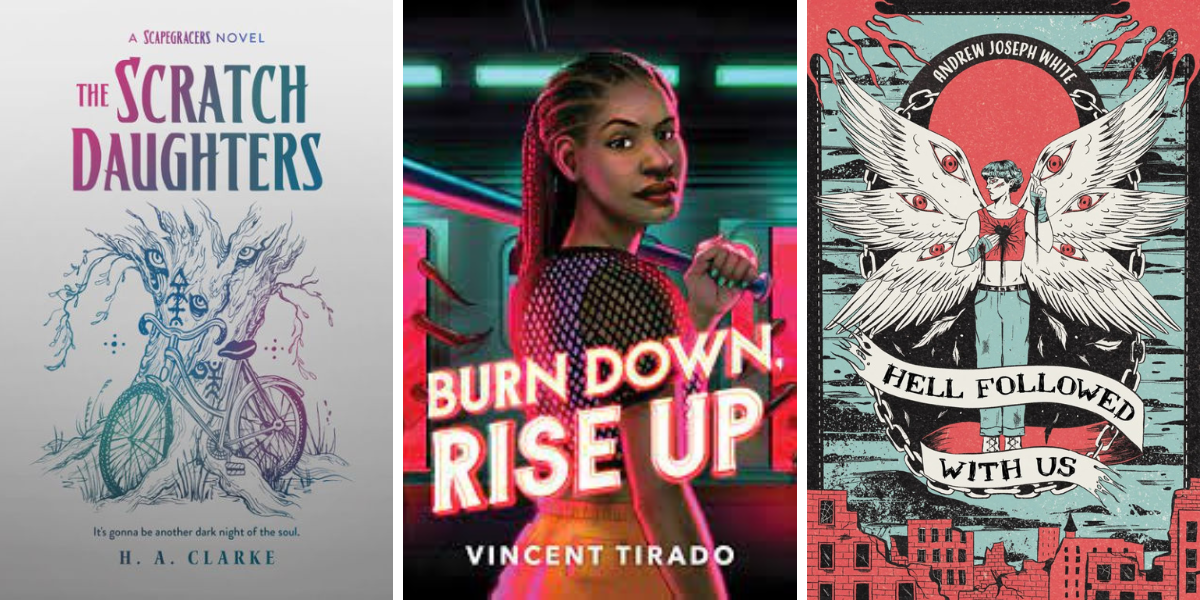
The Scratch Daughters by H.A. Clarke
The second book in The Scapegracers series, The Scratch Daughters picks up with its witch protagonist, Sideways, reeling from her crush Madeline stealing her ability to cast magic spells, not wanting to make out with her as she’d hoped. From this depressing yet narratively fruitful position, the action starts: Sideways sets off to hunt down Madeline, also contending with a family of witch hunters at the same time. This is a paranormal YA with charming humor, propulsive action, and characters you’ll want to root for (even Madeline, the magic thief). To top it all off, Clarke’s writing is lovingly descriptive and the book is a nuanced depiction of a butch lesbian, something even queer YA needs more of!
Burn Down, Rise Up by Vincent Tirado
This Afro-Latine sapphic YA horror will give you nightmares and you’ll say thank you. Set in a lovingly depicted, authentic Bronx, the story centers 16-year-old Raquel, who ends up playing a dark underground game with her crush Charlize in order to save Charlize’s cousin and maybe solve all the mysterious disappearances that have been plaguing their neighborhood. Burn Down, Rise Up is the kind of book that grips the reader immediately and doesn’t release its claws until the final page. It’s a smart social thriller that has a strong anti-racist message alongside its captivating weirdness and bloody gore.
Hell Followed With Us by Andrew Joseph White
White’s impressive debut is a horror dystopian novel about monsters: literal, figurative, without, and within. The protagonist is Benji, a trans teen guy infected with a bioweapon by the cult he was raised in; now that’s he’s escaped, he finds some safety with a ragtag group of LGBTQ teens, but he’s still a ticking time bomb. Dark in tone and with body horror, gore, and violence aplenty, Hell Followed With Us nevertheless displays a profound humanity with its focus on queer kids who continue to survive post-apocalypse and form a found family. This book is a challenge well worth investing in, especially as a searing critique of religious fundamentalism and terrorism.
What were your favorite queer books of 2022? Did they make the list? Please share your thoughts in the comments!



so, so many great picks, casey! to restrict myself to just one, i’m particularly grateful that you shouted out a million quiet revolutions – that book was STUNNING and didn’t get nearly the attention it deserved imo.
Not a single book in translation as far as I can tell? So much for “diversity”.
I’d love to hear about any queer books in translation published this year that you’d recommend Sofia!
Thieves by Lucie Bryon was originally published in French, but there was no translator listed for the English version that I could find, so I think this means Bryon did it herself!
I had a few books shortlisted that didnt quite make the list that are in translation, including Solo Dance by Li Kotomi and My Wandering Warrior Existence by Kabi Nagata. Check those out!
Do you have any specific books along those lines to recommend? Or have a good way for people to be able to search for LGBTQ+ books in translation?
The Feminist Press would be a good publisher to check out. They seem to do a number of translated books each year and they publish a fair amount of queer books!
I would love to see some books in translation, if anyone has any recs!
One published previously that I read this year and loved was Love in the Big City by Sang Young Park, and Terminal Boredom by Izumi Suzuki (short stories).
But apart from that this is a great list – between this and Nicos comics my tbr is out of control!
Ooh one more book in translation to recommend: Bad Girls by Camila Sosa ViLlada, by and about a trans Argentinian woman! Check content warnings before reading though, I think there’s a lot of heavy stuff.
I was so ready to jump in to these comments with lots of recs because my reading goal this year was to read more books in translation, and it ended up being about a third of my reading this year. HOWEVER when I looked at my list, most of my translated books were not from 2022. The only queer 2022 translations were My Wandering Warrior Existence (I love the whole series!) which Casey mentioned above, and Ghost Town by Kevin Chen (which I found out about in a Rainbow Reading roundup, and is focused on gay men.)
I think a lot of the reason for a lower percentage of translated books in lists like this is the timing of translations and the publicity for them! Unless a book has a ton of buzz or is a sequel, there’s usually a lag of multiple years between original language publication and translations. Also, early publicity and blurbs sometimes focus more on the country/culture/language of origin than queer elements, so they might slip under the queer radar until after they are published and reviewed within the US and Canada. Translated books only make up about 3% of the books published in the US (I don’t know the Canada stats) and a lot of those are coming from smaller presses, too.
All that being said, I do have a few recent-ish (not 2022 but last few years) queer books in translation that I’ve read this year and enjoyed :)
– The Membranes by Chi Ta-Wei (Taiwan. Originally published in 1996 but not translated until 2021. A short ambitious and surprising science fiction novel that I loved!! #2 or #3 of the year for me)
– Tentacle by Rita Indiana (Dominican Republic. 2015/2018. Rita Indiana is a queer (I think lesbian?) writer and musician and this is a great science fiction novel that also has elements of mysticism/spirituality.)
– La Bastarda by Trifonia Melibea Obono (Equatorial Guinea. 2016/2018.)
– Things We Lost in the Fire by Mariana Enriquez (Argentina. This is a little bit of an honorable mention because it’s a collection of short stories and at least one of them to me had a TON of queer subtext. Just incredibly atmospheric and open-ended horror with a lot to say about women in Argentinian society. Not as queer as the others though)
– “Kids Who Come Back” by Mariana Enriquez — I love her! I think this novella/story is published in the collection The Dangers of Smoking in Bed, and while the queer character is not the central one, it’s another great horror story with commentary.
I’m definitely going to check out Bad Girls, so thank you for that one!
Oh these sound incredible, particularly the first two! Sci fi in translation isn’t something I’ve explored that much yet, so this is so cool
Amazing recommendations thank you!!
I recommend Bad Girls by Camila Sosa Villada!
Great round up! Thanks, Casey! I appreciate the genre organization. I have read five of them and I added some to my to-read list for next year!
Yay!
Thank you for this list! Lots to check out.
Here are my own favourite queer/adjacent books from this year (new to me, if not necessarily to The World):
Matrix – Lauren Groff
The medieval convent novel to crush all medieval convent novels.
Small Angels – Lauren Owen
What’s that in the woods? Who’s that at the twilight gate? Why is the vibe at this bijou country church so off? A spooky jewel. Highly recommend the audio version.
There Are More Things – Yara Rodrigues Fowler
It’s a pleasure and a necessity to be provoked by expressly political fiction. What’s the point of reading? Is it to learn or feel, or do things? In which order, and what combinations? For anyone interested I’d recommend checking out Rodrigues Fowler’s interview on the Tender Buttons podcast (seems to available on Spotify only).
Black Water Sister – Zen Cho
What a ride.
I looooved Black Water Sister! Such a good book.
Ooh I own Black Water Sister, i should read it soon!
I’ve read 8 on the list! Pretty dang impressed with that. And several others are on my want to read list. Added more.
Other favorites from this year
A Restless Truth by Freya Marske – sapphic fantasy romance set in alt Edwardian England. There’s a heist and shenanigans on a cruise ship. And magic. And a sexual awakening with lots of sex. I loved it. It’s the 2nd in a trilogy – the first had a m/m couple. It’s pretty standalone but the first one is really really good too.
The Perfect Crimes of Marian Hayes – m/f bi Regency romance. A be queer, do crimes type enemies to lovers romance. Remarkably cozy given that the two protagonists meet when one tries to blackmail the other and they’re on the run for a big part of the book. It’s the sequel to an mm romance. Not sure how stand alone it is.
Legends and Lattes by Travis Baltree. Sapphic cozy fantasy about a retired mercenary orc who opens a coffee shop in a city that’s never heard of coffee. Exactly like reading a D&D campaign to open a shop and find community.
Nice work!!
I also loved the Perfect Crimes of Marian Hayes, one of my favourite reads this year. I loved how not typically heterosexual the sex scenes were even though it was an M/F couple. It felt very queer!
Yes, I loved how queer the sex scenes were too!
i adored legends and lattes!
Love this! This list is just what I needed. I live to read and also, I’m stuck at home with COVID-19. I’m reading this grey book called Sirens and Muses.Have you read it? I recommend. Thank you so much!
Sirens and Muses was a contender that didn’t quite make the list! A lot of people really liked it I think.
I read:
The Final Strife (this was terrible lol, I don’t know how anyone actually liked this when it was such a clumsy debut that overly defined every info dump, it wasn’t even really f/f, it was so repetitive and also fatphobic)
Spear (which was pretty good but I’m usually fond of Nicola Griffith)
Our Wives Under The Sea (I might have liked this book if it had been honestly marketed. I went in wanting sea horror and got boring instead.)
Manhunt (I love Felker-Martin’s essays but god, this book was not good! Not the writing, not the pacing, etc. It was novel but I’m more excited to see what trans horror spawns from this)
What Moves the Dead (this fizzled out halfway for me)
Helen House (Loved until the ending was fumbled)
The Lost Century (It was fine. Lacking in queer content imo)
What We Do in the Dark (Pretty good)
All This Could be Different (My favorite book on this list)
Brown Neon (the first essay is the best. The rest….)
Nona the Ninth (If Muir had a good editor, she would have left this as part of Alecto and not its own book)
Overall, just a disappointing year for me. I am growing less and less satisfied by books that are bad but gay. The gay does not make up for the bad writing, poor editing, and other issues with the text.
As someone who is still trying to unlearn my distaste for not finishing books, I would encourage you to abandon books early on if they’re not doing it for you! There are so many queer books out there these days to spend time reading ones that you don’t like. I have never regretted not finishing a book I was not enjoying or admiring.
Yeah, not all of these I ended up finishing, though I’d thumb to the end to see what happened. Sometimes I end up finishing the read if something totally surprising happened and end up being surprised.
But a lot of the books on that list I was very hyped for and looking forward to. The random finds I didn’t know about ended up being the books I liked best.
Totally agree on the not finishing books recommendation! I would estimate that maybe a quarter to a third of the books i start I don’t finish. Some I will go back to later and some I won’t.
Not even necessarily because it’s a bad book, but i just start it and find that it’s not what I’m in the mood for. When i started following my whims a bit more, my reading increased a lot and my enjoyment too! I only finished a few books i didn’t love this year. One was for book club, and we all had a fantastic time criticizing it at the meeting, and one or two others were interesting enough for me to want to finish them even if i didn’t end up loving them.
Agreed, you might think abandoning books will make you read less, but it can have the opposite effect because you’re always reading something you love and want to read all the time!
Yeah I have the same experiences sometimes! Often I prefer not to know a lot about a book before starting it. The hype can make your expectations too high or make you expect something the book is not.
I read and enjoyed Delilah Green Doesn’t Care, Kiss Her Once For Me, I Kissed Shara Wheeler and Mistakes Were Made. A few of my other queer favourites from this year:
– Count Your Lucky Stars by Alexandria Bellefleur
– Love and Other Disasters by Anita Kelly
– She Gets The Girl by Rachel Lippincott and Alyson Derrick
– The One True Me and You by Remi K. England
– Home Field Advantage by Dahlia Adler
– In The Event of Love by Courtney Kae
– Astrid Parker Doesn’t Fail by Ashley Herring Blake (the sequel to Delilah Green Doesn’t Care)
Ooh great romance recommendations! I loved She Gets the Girl too. The fact that it’s written by a cute wives team who met in university like the characters is a fun detail too.
YA is such a hard category for this list because there is soooooo much queer YA but She Gets the Girl almost made it on!
Hey Casey! Thank you so much for putting together this list! I know it must take tons of time and it’s always one of my favorite articles of the year.
I was a bit surprised to not see Small Game on the list because I read about how much you loved it (and how queer it was) on your blog. But then I noticed that the headline says there are 92 books, and there are only 81 posted here. It made me super curious about those other 11 books! Was there a typo in the headline, or are there 11 more books to explore? (I’m hoping there are even more books! :D )
Yay, I’m so happy to hear that!
Lol lol embarrassingly enough I just cannot count??? There are not 11 books missing, you’re right there are just 81 books 📚
Small Game, yes I loved it! And Darcy did a great interview with the author on AS too. Contemporary / lit fic has always been a very stacked category and it was one of the ones I had to cut from the shortlist.
i’ve read 15 of these which would have horrified me a few years ago as a list-completionist but there is just so much queer stuff to read now! i cannot possibly keep up! a lot of my queer reads from this year weren’t published this year too, and i’m sure many of the titles on this list will make their way into my hands and brain next year
time is fake read gay stuff
I love that you included Man o’ War! It was my absolute favorite this year and I haven’t heard anyone talking about it!
Thanks for the list Casey I have populated my holds list at the library.
I’ve missed the chance to recommend it for the holiday but Olivia Waite who writes some great sapphic regency romance wrote a little holiday novella called Hen Fever that I found extremely charming.
Love this, Casey! I got Moonflower from the library yesterday and finished it today. Not sure the last time I cried so much. Such a beautiful book.
@caseythecanadianlesbrarian – I maaay have missed this on an AS list, but I just read The Woman In The Woods and other North American Stories – a cautionary fables & fairytales book.” it is FULL of stories by trans, TS, nonbinary, and queer indigenous writers & illustrators! it’s great!
This looks so great! Thanks for putting it on my radar.